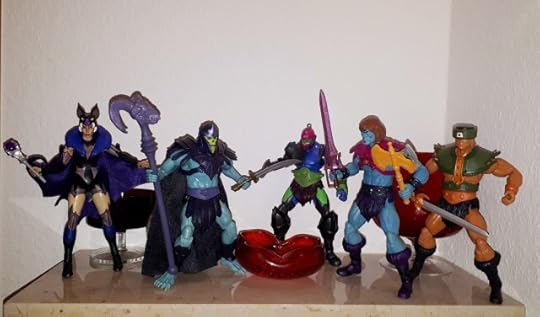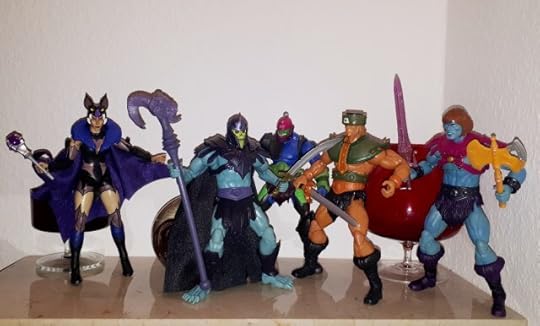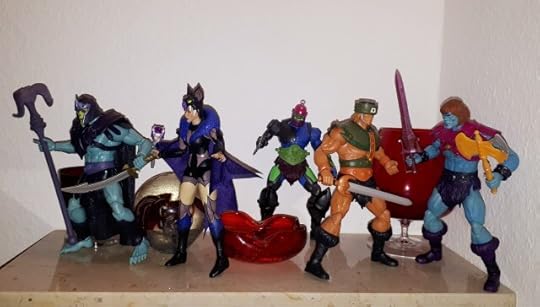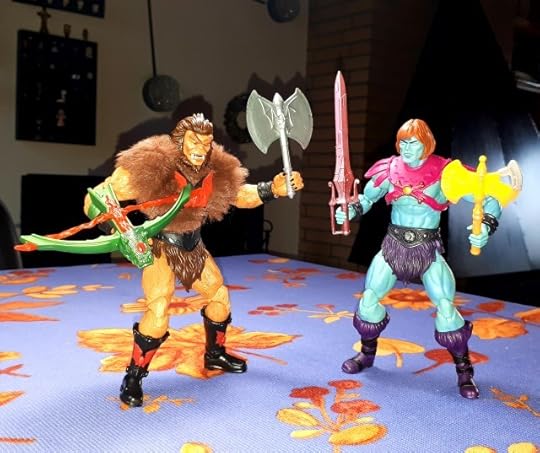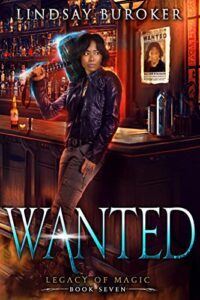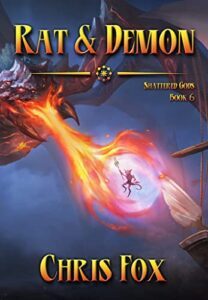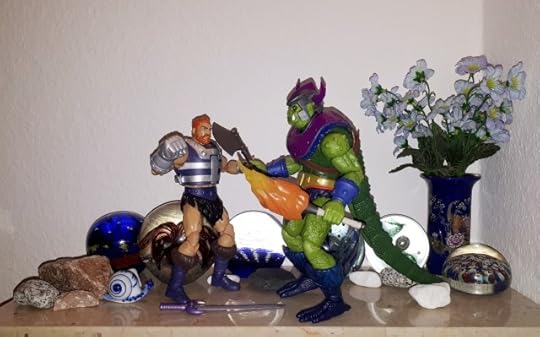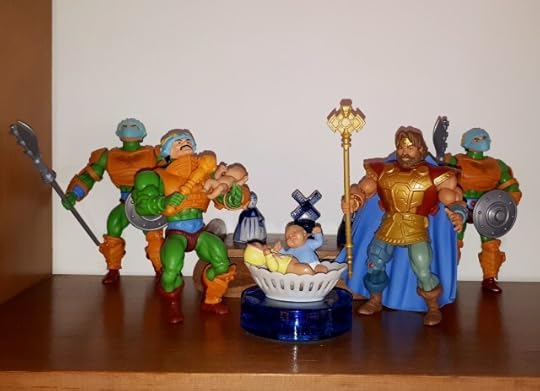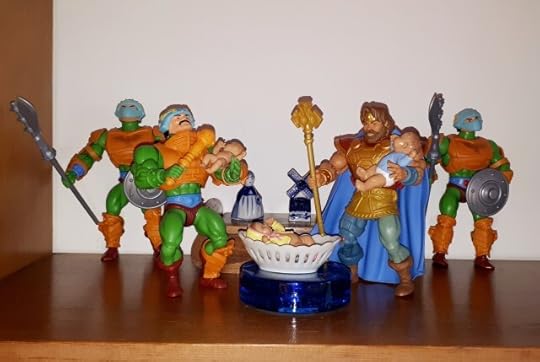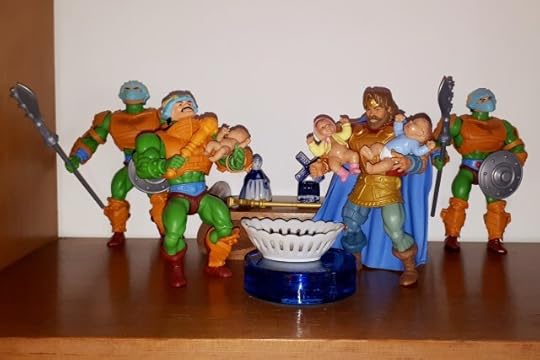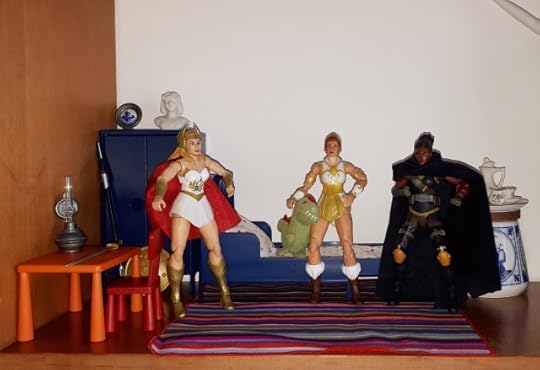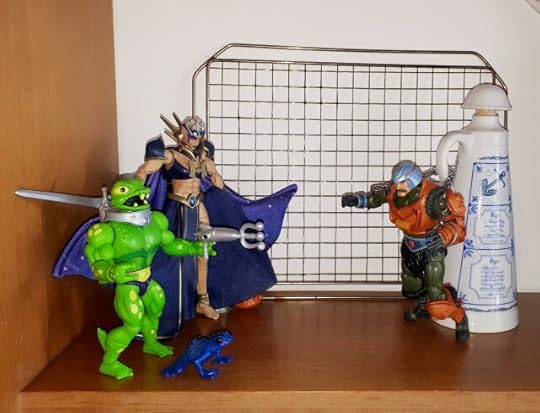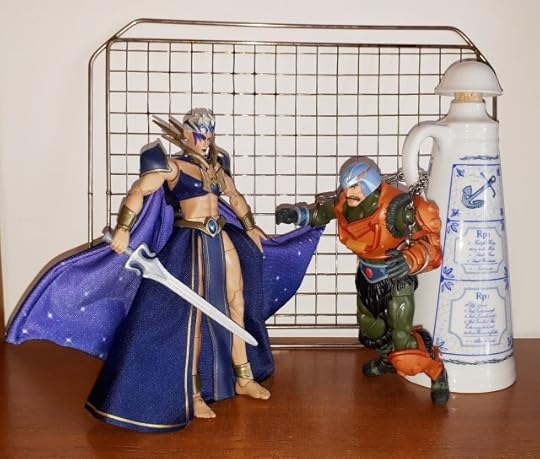Cora Buhlert's Blog, page 11
July 7, 2023
Some Thoughts on the 2023 Hugo Finalists
After taking an inordinately long time to tabulate the nominations, the Chengdu Worldcon finally announced the 2023 Hugo finalists last night – after accidentally posting a not quite correct list on their website a few days ago.
Of course, there is no Worldcon without drama, including Hugo drama. That said, this is certainly something new.
The full and correct list of finalists may be found here. And now, let’s delve right into the categories under the cut:
Best NovelThis 2023 Hugo finalists for Best Novel not only have a lot of overlap with my own ballot, it’s also a very good if not overly surprising list.
Every volume in Tamsyn Muir’s Locked Tomb series so far has been a Hugo finalist, so I’m not at all surprised to see Nona the Ninth on this list. Though this reminds that I’m behind with this series and haven’t read Nona yet.
The Kaiju Preservation Society by John Scalzi just won the Locus Award – to some controversy – and besides John Scalzi is a very popular author, so I’m not surprised to see the novel nominated here. Though this will also piss off a lot of people both on the left and the right.
I enjoyed The Spare Man by Mary Robinette Kowal a whole lot and am happy to see it nominated, though again it’s not a huge surprise. This was also on my ballot BTW.
T. Kingfisher a.k.a. Ursula Vernon is a favourite of Hugo voters and has been nominated and won several times before, though this is her first Best Novel nomination, if I’m not mistaken. Besides, Nettle and Bone is a great novel and was also on my ballot.
Silvia Moreno-Garcia has had several Nebula nominations and her career has really taken off in the past two years or so. However, The Doctor of Doctor Moreau is her first Hugo nomination. It’s also a fairly rare example of a horror novel getting a Hugo nomination. This was also on my ballot coincidentally.
Legends & Lattes by Travis Baldree was one of the breakout SFF success of the past year. Legends & Lattes also started out as self-published, though it was quickly picked up by Tor. I enjoyed the book a lot and am happy to see it get a Hugo nod, especially since it shows that yes, cozy fantasy is popular and not just a niche subgenre. This is another finalist that was also on my personal ballot, which gives me a four out of five hit rate. The Red Scholar’s Wake by Aliette de Bodard is the only one of my personal nominees in this category who did not make it and it’s probably further down on the longlist.
One book that’s notable by its absence is Babel by R.F. Kuang, since it was on a lot of “Best Books of 2022” lists and also won the Nebula and Locus Award. Of course, it may just have missed the ballot by a few votes. After all, this wouldn’t be the first time that a Nebula winner for Best Novel did not make the Hugo ballot – two recent examples that come to mind are A Song for a New Day by Sarah Pinsker in 2020 and Annihilation by Jeff VanderMeer, which won the Nebula and Shirley Jackson Award in 2015 and did not make the Hugo ballot. Or maybe R.F. Kuang declined.
Those who worry that men, particularly straight white American cis men, are being shut out of the Hugos will be pleased that we have two white American cis men on the ballot for Best Novel this year. Of course, those same people will probably complain that one of those men is John Scalzi, because lots of people love to hate John Scalzi. And quite a few people have issue with Travis Baldree as well for being too cozy and writing about lesbian orcs. And indeed I have already seen some grumblings online about these two finalists in particular.
Diversity count: 2 men, 4 women, 2 international writers*, 1 writer of colour
Best NovellaEven Though I Knew the End by C.L. Polk won the Nebula Award in this category. It’s a lovely urban fantasy retro-noir story, so I’m glad to see it here. This novella was on my personal longlist.
I’m really, really happy to see Ogres by Adrian Tchaikovsky on the ballot, for while Adrian Tchaikovsky won the Arthur C. Clarke Award a few years ago and frequently shows up on the BSFA ballot, he never got any Hugo love until his nomination for the (excellent) Elder Race last year. Coincidentally, this is the only one of my personal nominees in this category who made it. It’s also the only novella on the ballot not published by an imprint of Tor, though that does not fail to stop the people who complain that all the finalists are published by Tor.
A Mirror Mended by Alix E. Harrow is the sequel to last year’s finalist A Spindle Splintered. I haven’t read this one yet.
Into the Riverlands by Nghi Vo is a sequel to the 2021 Best Novella Hugo winner The Empress of Salt and Fortune. Again, I’m afraid that I haven’t read this one yet.
The Wayward Children series by Seanan McGuire is a longtime favourite with Hugo voters, so I’m not surprised to see the latest installment Where the Drowned Girls Go on the ballot. Coincidentally, this also means that Seanan McGuire has an amazing thirteen-year interrupted streak of Hugo nominations.
As I said above, T. Kingfisher a.k.a. Ursula Vernon is very popular with Hugo voters and makes another appearance on the 2023 Hugo ballot with What Moves the Dead. The fact that she’s a great writer doesn’t hurt either. This is another 2023 Hugo finalist that is horror (and published by Tor’s Nightfire horror imprint), so the simmering resurgence of the horror genre is breaking into the general SFF sphere by now.
Notable by its absence is A Prayer for the Crown-Shy by Becky Chambers, which just won the Nebula Award in this category. Again, it maybe missed the ballot by a few votes or Becky Chambers declined.
Diversity count: 1 man, 4 women, 1 non-binary, 2 international writers, 2 writers of colour
Best Novelette“If You Find Yourself Speaking to God, Address God with the Informal You” by John Chu is not just a lovely gay superhero romance, but also the 2023 Nebula and Locus Award winner for Best Novelette. This was also on my personal ballot.
I have been enjoying Marie Vibbert’s short fiction as well as her debut novel for a while now, so I’m thrilled that her novelette “We Built This City” made the ballot. Coincidentally, this was another of my nominees.
“Murder By Pixel: Crime and Responsibility in the Digital Darkness” by S.L. Huang is a novelette I liked a lot and I’m happy to see that others agree with me. It was on my personal longlist, though in the end it did not make my ballot, because there are a lot of good novelettes published in any given year.
“A Dream of Electric Mothers” by Wole Talabi was also a Nebula and Locus finalist in this category, plus it’s a very good story. Coincidentally, Wole Talabi is only the second black African-born Hugo finalist after Oghenechovwe Donald Ekpeki (who is also on the ballot again in the Best Editor category) last year. There were three other African-born Hugo finalists (Manly Wade Wellman, J.R.R Tolkien and Dave Freer), but they were all white. The increased visibility of African SFF in the West is also reflected on the Hugo and other award ballots by now.
I haven’t yet read either “The Difference Between Love and Time” by Catherynne M. Valente nor “The Space-Time Painter” by Hai Ya. That said, I usually enjoy Catherynne M. Valente’s work and look forward to reading this story. I am unfamiliar with Hai Ya and couldn’t find out anything about him, not even on the website of Galaxy’s Edge magazine, but I’m looking forward to reading his work.
We have our first Chinese finalist, Hai Ya, in this category. There will be more the further we move down the ballot.
We also have a nice range of sources in this category. Two finalists appeared in Clarkesworld, one in Uncanny, one in Galaxy’s Edge (this is not the US magazine Galaxy’s Edge, but its Chinese counterpart) and two appeared in anthologies. So much for “It’s just Tor/Tor.com”.
Diversity count: 3 men, 3 women, 2 international writers, 4 writers of colour
Best Short StoryJohn Wiswell is one of the most exciting new voices in our genre to emerge in recent years and I am happy to see him on the ballot again with “D.I.Y.”
I’m afraid I still haven’t read “Rabbit Test” by Samantha Mills, though considering it already won the Nebula and Locus Award in this category and has now made the Hugo ballot as well, I really should.
The remaining four finalists in this category are all Chinese stories and don’t seem to be currently available in English – at any rate, I couldn’t find anything online. That said, Regina Kanyu Wang is a name that’s familiar as a writer and tireless champion of Chinese science fiction. There’s a great interview with her in English on the website of the Literaturherbst festival in Heidelberg, Germany, which also mentions her Hugo-nominated story “Zhurong on Mars” (you have to scroll down past a lot of other interviews).
I’m not familiar with the works of Jiang Bo, Ren Qing or Lu Ban so far, though I look forward to checking them out. Lu Ban and Jiang Bo have both had stories published in Clarkesworld or the Sinopticon anthology, but I wasn’t able to find out anything about Ren Qing, who has the misfortune of sharing a name of several other people as well as a common Chinese phrase. Though their story “Resurrection” is available in English in this anthology, translated by Blake Stone-Banks.
With regards to sources, we again have a nice variety. Three finalists were published in Science Fiction World (well, it is the biggest science fiction magazine on the planet) and one each in Uncanny, Tor.com and Frontiers, which appears to be another Chinese mag.
Diversity count: 4 men, 2 women, 4 international writers, 4 writers of colour
Best SeriesThe Locked Tomb series by Tamsyn Muir has been popular with Hugo voters with every volume so far getting nominated, so it’s not surprising to see the series as a whole get a Hugo nod as well. That said, the final volume is supposed to come out this year, so I expected that nominators would wait until the series was complete before nominating it.
October Daye by Seanan McGuire and Rivers of London by Ben Aaronovitch are two popular and very good urban fantasy series, that we’ve seen on the Hugo ballot before. Coincidentally, both are also exactly the sort of books the Best Series Hugo was created for, series, where individual books don’t necessarily stand alone well enough to be nominated in Best Novel, but where the series as a whole is greater than the sum of its parts.
Adrian Tchaikovsky shows up on the 2023 Hugo ballot again with his very good Children of Time trilogy, the first volume of which won the Clarke Award back in 2016. So it really seems as if Hugo nominators have finally discovered the greatness of Adrian Tchaikovsky.
Robert Jackson Bennett was nominated in this category for his Divine Cities trilogy back in 2019 and is now back with the Founders trilogy, which I’m afraid I haven’t read.
The last finalist in this category is Naomi Novik with her Scholomance series. The series is clearly popular with Hugo voters, since all three volumes to date were nominated for the Lodestar Award and the second volume won last year. However, I’m afraid the series doesn’t really work for me, probably because I don’t care for school settings and so-called dark academia at all.
Personally, I’m sad that Elric by Melniboné by Michael Moorcock did not make the ballot, because not only is it a seminal sword and sorcery series, it’s also the longest running series written by a single author ever, as far as I know. The first Elric story “The Dreaming City” appeared in 1961, The Citadel of Forgotten Myths in 2022, i.e. the series has been going for a whopping 61 years. Plus, Michael Moorcock has never won a Hugo due to the longstanding anti-fantasy bias of the Hugos and the undeserved dominance of John W. Campbell’s Analog in the 1960s, when he was editing New Worlds. That said, a new Elric story will appear later this year in New Edge Sword and Sorcery No. 1, so maybe we can rectify this oversight next year.
Diversity count: 3 men, 3 women, 3 international authors
Best Graphic StoryThis category is a mix of the expected and unexpected. Supergirl: Woman of Tomorrow and volume 10 of Saga are excellent comics and were both on my ballot. I did not nominated volume 7 of Monstress and volume 4 of Once & Future this time, though I’m not surprised to see them on the ballot, because they’re both popular and well regarded series.
The remaining two finalists, however, came as something of a surprise to me, because I certainly did not expect to see either the videogame tie-in Cyberpunk 2077: Big City Dreams or Dune: The Official Movie Graphic Novel on the Hugo ballot. And while vaguely knew that there are Cyberpunk 2077 tie-in comics, I had no idea that there even was a Dune graphic novel adaptation.
Now media tie-in comics are not necessarily bad – indeed there have been some very good ones. Marvel’s ROM the Space Knight and The Micronauts comics of the 1980s transcended and outlived the forgotten toylines they were based upon, Dark Horse has published some very good Star Wars, Alien and Predator comics over the years and the 2012 DC Comics Masters of the Universe run was remarkably good, as was the Masters of the Multiverse mini-series. So the two tie-in comics might very well be good.
However, tie-in comics on the Hugo ballot were a phenomenon in the early years of the Best Graphic Story Hugo, because a lot of Hugo nominators were not necessarily comic readers, but they did read and nominate tie-in comics to something else they already liked. In recent years, Hugo nominators are more likely to nominate a few popular and good comic series not affiliated with any other media, though the Hugos are less good at recognising new talent than the Eisners, because they are not a pure comic award.
ErsatzCulture has dug up a Hugo recommendation list posted on a Chinese website, which includes the Dune graphic novel and Cyberpunk 2077: Big City, which would explain these two unexpected finalists.
No diversity count, too many people are needed to make comics. That said, the nomination for Cyberpunk 2077: Big City may well have given Poland its first ever Hugo finalists.
Best Related WorkThe good news first: The 2023 Hugo finalists for Best Related Work are almost entirely the sort of serious and well-researched non-fiction I prefer to see in this category. There’s only one edge case finalist and that finalist is less edgy than some other finalists we have seen in this category in recent years.
Alas, not a single of the many 2023 SFF-related non-fiction books I featured as part of my Non-Fiction Spotlight project made the ballot this year. Still, it’s good to see a Best Related Work ballot that actually contains mostly non-fiction.
So let’s take a look at the finalists:
Blood, Sweat & Chrome: The Wild and True Story of Mad Max: Fury Road by Kyle Buchanan is a chronicle of the making of a very popular SFF movie, that was also a Hugo finalists in its own right. I wanted to feature this book and also had requests to feature it, but I couldn’t contact the author.
Terry Pratchett: A Life With Footnotes by Rob Wilkins is a biography of a hugely beloved writer of our genre, written by his former assistant. Again, I would have loved to feature this one, but had no way of contacting the author.
Still Just a Geek: An Annotated Memoir by Wil Wheaton is exactly what it says on the tin. In this case, I didn’t even try to contact the author, since I suspect Wil Wheaton has better things to do than answer the questions of a small fry blogger.
ETA: Wil Wheaton shares this charming post about his joy to be nominated for a Hugo.
Chinese Science Fiction, An Oral History, Volume 1 by Yang Feng is absolutely the sort of book that I love to see in this category, though I was not aware of it until today. There’s some info about it in English on the website of the Chengdu Worldcon.
“The Ghost of Workshops Past” by S.L. Huang is an extensive non-fiction article about the origins of the so-called Milford creative writing workshop model (i.e. the model that most of us who ever took a creative writing workshop in a western country will be familiar with), its connections with the Cold War and the CIA, how the Milford model can be harmful, particularly to marginalised writers, and how writing workshops can do better. It’s a great article.
Now we come to the edge case finalist in this category, namely the Buffalito World Outreach Project by Lawrence M. Schoen. So what is the Buffalito World Outreach Project? It’s the same short story translated into more than thirty different languages, so that people all over the world can enjoy it. Some of the translations may be found on Lawrence M. Schoen’s website and there also is a book version available. So yes, it’s definitely an edge case finalist, but one that I as a translator and linguist have a lot of sympathy for. Plus, this appears to be Lawrence M. Schoen’s first Hugo nomination, though he’s had several Nebula nominations.
Diversity count: 5 men, 1 women, 2 international writers, 2 writers of colour
Best Dramatic Presentation LongThis is the one category I have mixed feelings about, because I don’t particularly care for several of the finalists and find one outright unworthy.
Everything Everywhere All at Once is probably the least unexpected Hugo finalist on the entire ballot. I also strongly suspect that it will win, since it has already won every other award under the sun. But since it’s also a really good movie, I don’t mind.
Black Panther: Wakanda Forever is one of the best Marvel movies in the rather lacklustre phase IV to date and I’m happy to see it on the ballot.
I still haven’t gotten around to watching Severance, because I don’t have a lot of time to watch TV and I also have problems connecting with office workplace dramas, because I have never worked in anything even remotely like a US-style cubicle open plan office. About the only office-set workplace drama I ever had any interest in was Mad Men and what drew me to Mad Men was the 1960s period setting as well as the behind the scenes look at the advertising industry. I couldn’t care less about all the soap opera antics of who’s sleeping with whom this week. And most office dramas pay little to no attention to the actual work these people do and focus instead on petty office politics, rivalries and affairs, which I have zero interest in, neither in fiction nor in real life. So in short, I didn’t watch Severance, because it looks superficially like a genre I dislike. Still, I guess I’ll have to watch it now. Who knows, maybe I’ll even enjoy it?
Nope is another movie I haven’t yet gotten around to watching, probably because Jordan Peele’s films are hit and miss for me. I liked Get Out!, didn’t care for Us at all. Nope also seems to have gotten less attention than eithe Get Out! or Us, so I’m a little surprised to see it here.
At first glance, Turning Red is another surprise, even though Disney/Pixar animated movies have won quite a few Hugo nominations over the years. Plus, Turning Red was very popular with Chinese viewers, because of it’s set in the Chinese ex-pat in Toronto and the director is Chinese-Canadian. Ironically, this is the reason why (white male) western critics disliked the film and claimed they couldn’t connect with it (probably because they’re not the target audience) and were made uncomfortable by the fact that it’s about puberty and periods and teenage crushes. Because obviously, every movie must speak to the white male experience. I haven’t yet watched Turning Red either, because I’m not the target audience for an animated fantasy movie cum puberty metaphor either, though I remember being a teen girl well enough.
Finally, we get to the finalist whose presence on the ballot really irks me, namely Avatar: The Way of Water. Now I don’t like James Cameron and think he has made exactly three good and one decent film, all of them thirty or more years ago. Everything he made since then has been downhill, but inexplicably popular. That said, I can understand why people flocked to the theatres to see the original Avatar in 2009, because of the sheer visual spectacle and novelty of the whole thing. However, the original Avatar has long since become the butt of jokes, the once spectacular visuals are a lot more commonplace and the last thing it needed was a sequel thirteen years later. However, Cameron can basically do whatever he likes by now and if that means foisting Avatar sequels on the public, then so be it. However, that thing isn’t even remotely Hugo worthy and it annoys me that this thing made the ballot when films like Prey, Neptune Frost, The Northman, Three Thousand Years of Longing or You Won’t Be Alone didn’t. Avatar: The Way of Water was also slammed by critics and didn’t seem to garner a lot of audience love either. However, it apparently was extremely popular in China, which probably explains why it made the ballot.
No diversity count, too many people are needed to make movies.
Best Dramatic Presentation ShortThis is normally a category I’m not very happy with, since my tastes in SFF TV seems to be wildly out of step with those of the majority of the Hugo electorate. That said, this year’s Best Dramatic Presentation Short ballot looks pretty good, even though only two of my personal picks made it.
Of the three Star Wars shows that streamed in 2022, Andor was the best (though I did have some issues with it) and is rightfully represented with two episodes on the Hugo ballot, “One Way Out” a.k.a. the prison break episode (which was also one of my nominees) and “Rix Road”, the season finale.
I enjoyed She-Hulk: Attorney at Law a whole lot, partly for personal reasons, because She-Hulk has been a favourite superheroine of mine since the 1980s. Therefore, I am really happy to see the fourth wall breaking season finale “Whose Show Is This?” on the ballot. This was also one of my nominees.
When I saw an episode of The Expanse on the ballot, my initial thought was, “Huh, this has to be a mistake, because The Expanse ended in 2021.” However, two episodes of season 6, including the series finale “Babylon’s Ashes”, aired in early January 2022, so The Expanse got onto the Hugo ballot again by the skin of its teeth. Which I’m fine with, because The Expanse was a very good science fiction series that got less Hugo love than it would have deserved due to being overshadowed by the inexplicably popular Good Place for much of its run.
Stranger Things is another hugely popular SFF TV series that got less Hugo love than one would expect for such a beloved show – only one nomination for season 1 in 2017, where it lost out to Arrival. So I’m happy to see it on the ballot again with the season 4 episode “Dear Billy”.
I’m afraid that I continue to have zero interest in For All Mankind and don’t quite get its popularity with Hugo voters, especially given the absolute riches of good SFF television out there. Though at least it is better than The Good Place.
For the second year in a row, there is no episode of Doctor Who on the Hugo ballot, even though three Doctor Who specials aired in 2022. I guess this means that the era of the guaranteed Doctor Who spot on the ballot is over, which I for one am glad about. Not that mind Doctor Who, but if it makes the Hugo ballot, it should at least be good and not just nominated out of habit.
Also notable by its absence is Star Trek, even though Discovery, Picard and Strange New Worlds all aired in 2022. And while season 4 of Discovery was uneven, it did have a few good episodes – and indeed one of them was on my personal ballot. Season 2 of Picard was uneven as well, but also a lot of fun, and Strange New Worlds was actually really good. Still, Star Trek clearly isn’t the Hugo ballot draw it once was.
It’s also notable that the two duelling mega-budget epic fantasy series Lord of the Rings: The Rings of Power and House of the Dragon are completely absent from the ballot. Of course, nobody seems to have liked The Rings of Power very much, but House of the Dragon seemed to be quite popular. The third epic fantasy series of 2022 (and the one I actually liked best) Willow is also absent from the ballot, but then it was hampered by airing over the Christmas/New Year period.
In the past few years, we’ve seen several animated series on the Hugo ballot, but sadly not a single animated series made the ballot this year in spite of some very good and popular animated series such as Primal, The Dragon Prince, Dragon Age Absolution, The Owl House and the CGI He-Man and the Masters of the Universe being eligible.
No diversity count, too many people are needed to make TV shows.
Best Editor LongTor.com‘s Lee Harris and Ruoxi Chen have both been nominated in this category before. Lindsey Hall, also from Tor, and Sarah Peed from Del Rey are first time finalists.
We also have two Chinese editors, Huan Yan and Haijun Yao, nominated in this category. Haijun Yao is an important name in Chinese science fiction and highly worthy finalist. Unfortunately, I couldn’t find out anything about Huan Yan, since they share a name with a prominent Chinese chemist. According to ISFDB, they have edited the Chinese editions of Mary Robinette Kowal’s Lady Astronaut novels.
Diversity count: 2 men, 3 women, 1 unknown, 3 international editors, 3 editors of colour.
Best Editor ShortScott H. Andrews, Neil Clarke, Oghenechovwe Donald Ekpeki and Sheree Renée Thomas are all returning finalists and most excellent choices. Plus, of these four, only Neil Clarke has ever won the Hugo.
We also have two Chinese finalists in this category, Xu Wang and Fen Yang. Again, I had some problems finding out more information about them, because both have several namesakes, including some who edit scientific journals. According to ISFDB, Xu Wang has edited a number of science fiction anthologies. I also found a profile of a Chinese editor named Feng Yang, so maybe her name has been misspelled on the announcement.
Diversity count: 3 men, 2 women, 1 unknown, 3 international editors, 4 editors of colour
Best Professional ArtistAlyssa Winans is a friend and a great artist and I’m really happy to see her on the ballot again.
Paul Lewin’s name was new to me, though his stunning artwork wasn’t and I’m happy to see his work recognised.
Sija Hong is another artist I wasn’t familiar with, though once again her work is beautiful.
I have admired Kuri Huang’s beautiful artwork on book covers, though again I wasn’t familiar with her name so far.
Jian Zhang is another artist I wasn’t familiar with at all. Interestingly, in a category that is mostly dominated by illustrators, cover artists and comic artists, here we have a painter of surreal still lives.
Enzhe Zhao is a Chinese concept and game artist who does absolutely stunning space artwork. Again, I wasn’t familiar with their work, but I like what I see very much.
Diversity count: 3 women, 2 men, 1 unknown, 5 international artists, 6 artists of colour
Best SemiprozineWe have a lot of returning favourites in this category, since Uncanny Magazine, Strange Horizons, FIYAH, Escape Pod and PodCastle are all finalists we’ve seen before. They’re all very good choices, too.
khoréo (sorry for butchering the title, but WordPress’ well-known issues with diacritics strike again), a magazine dedicated to speculative fiction by immigrant and diaspora writers, is the one new finalist in this category and another fine choice.
No diversity count, too many people are needed to make magazines.
Best FanzineWe have four returning favourites in this category, namely Galactic Journey, Journey Planet, The Unofficial Hugo Book Club Blog and nerds of a feather. All four are great fanzines and friends, besides. Furthermore, I have contributed to two of them in the past year, namely Galactic Journey and Journey Planet.
The remaining two finalists are two Chinese fanzines, Chinese Academic SF Express and Zero Gravity Newspaper, that I’m not familiar with. I look forward to exploring their work.
No diversity count, too many people are needed to make fanzines.
Best FancastThis category is full of great podcasts that also happen to be friends.
Worldbuilding for Masochists, Hugo Girl! and Octothorpe are all great podcasts and good friends and I’m thrilled to see them on the ballot again. I’m also thrilled to see my friend Seth Heasley make the ballot with his Hugos There podcast.
The Coode Street Podcast is the veteran in this category, since they have been on the ballot almost every year (excluding the puppy unpleasantness of 2015/16) since the inception of the category in 2012. Kalanadi, which also was a finalist in 2021, holds up the flag for the BookTubers.
No diversity count, too many people are needed to make podcasts.
Best Fan WriterNope, I’m not nominated this year. Nor did I expect to be, because I have a shiny rocket and I think other people should have the chance to win one as well. Besides, we have some really great finalists in this category.
Chris M. Barkley and Jason Sanford have both been ballot before. They are highly deserving finalists and friends as well. Jason’s Genre Grapevine columns are must-reads for anybody even remotely interested in SFF publishing. And I always enjoy Chris’ insightful columns at File 770. In his latest column, he talks about his reactions to finding himself on the Hugo ballot for the second time.
2023 is also turning out to be a great year for Twitter fiction with returning finalist Bitter Karella, the mastermind behind the fun Midnight Society account, and first time finalist Örjan Westin, whose MicroSFF stories on Twitter I have been enjoying for years.
I wasn’t familiar with the two Chinese finalists RiverFlow and Arthur Liu before, though we’ve since met online and I look forward to checking out their work. Arthur Liu was involved in the Chinese Science Fiction issue of Journey Planet and RiverFlow penned this article about Chinese fan and prozines by RiverFlow at Strange Horizons (translated by Emily Jin). RiverFlow also shares his feelings upon learning that he was a double Hugo finalist in this letter published on Twitter.
Diversity count: 5 men, 1 woman, 3 international writers, 3 writers of colour
Best Fan ArtistThis category is once again a mix of returned favourites and new faces.
We’ve seen the beautiful artwork of Iain J. Clark and Laya Rose on the Hugo ballot before. Alison Scott is another familiar name as part of the Octothorpe podcast as well as a Hugo winner for Plokta, but we haven’t seen her as an artist on the ballot before.
España Sheriff has been a Hugo finalist as part of Team Journey Planet, but not in her own right so far.
Orion Smith is an artist whose work is new to me, though I like what I see.
Richard Man is a photographer who has documented cons and portrayed many SFF writers, artists, fans, etc… I think he may be the first portrait photographer to be nominated for a Hugo, though we did have a Finnish toy photographer on the ballot a few years ago.
Diversity count: 2 men, 3 women, 1 non-binary, 4 international artists, 1 artist of colour
LodestarThis category is full of familiar names, many of whom we’ve seen in this category before.
Akata Woman by Nnedi Okorafor is the sequel to the inaugural Lodestar winner (back in 2018, before the Lodestar Award officially had its name). I enjoyed the previous book, so I’m sure I’ll enjoy this one as well.
Bloodmarked by Tracy Deonn is the sequel to the 2021 Lodestar finalist Legendborn. I haven’t read this book yet, but I liked the previous book in the series, so I’m sure I’ll enjoy this one as well.
Dreams Bigger Than Heartbreak by Charlie Jane Anders is the sequel to last year’s Lodestar finalist Victories Greater Than Death, which I liked a whole lot.
The Golden Enclaves by Naomi Novik is the latest instalment in her Scholomance series, which is also nominated for Best Series. As I said above, the Scholomance don’t work for me, because I’m very much over school settings and dark academia. There’s also some grumbling, because the Scholomance books are not explicitly published as YA. I suspect a lot of people view them as YA because of the school setting.
In the Serpent’s Wake by Rachel Hartman is the sequel to the 2019 Lodestar finalist Tess of the Road. I remember that I did not like Tess of the Road all that much, but that was probably because it was the last thing I read for the 2019 Hugos (I usually leave the Lodestar finalists for last) and also the third of three Lodestar finalists with very similar plots, so my eagerness to be done probably influenced my view of the book. Perhaps I’ll enjoy the sequel more.
Osmo Unknown and the Eightpenny Woods by Catherynne M. Valente wasn’t on my radar at all, though I know that Catherynne M. Valente does write for young readers on occasion. This one appears to be middle grade rather than YA and certainly looks cute.
Diversity count: 6 women, 2 writers of colour
AstoundingTravis Baldree’s Legends & Lattes was definitely one of the breakout SFF books of 2023, so I’m happy to see him on the Astounding ballot.
Everina Maxwell was an Astounding finalist last year as well. I enjoyed her novels Winter’s Orbit and Ocean’s Echo very much and am happy to see her back.
Naseem Jamnia burst onto the scene this year with The Bruising of Qilwa, which I haven’t read yet, but look forward to.
I’ve enjoyed several of Isabel J. Kim’s stories in various SFF mags and am happy to see her on the ballot.
Weimu Xin is a Chinese writer and translator whose work I’m not yet familiar with. Once again, I look forward to checking it out.
I haven’t been able to find out much about Maijia Liu, though I suspect they are the author of this book. Unfortunately, Google returns a lot of hits for the Chinese spy fiction author Mai Jia, who is a different person with a similar name.
Diversity count: 1 man, 3 women, 1 non-binary, 1 unknown, 3 international authors, 4 authors of colour
***
Many thanks to Best Fan Writer finalists RiverFlow and Arthur Liu for supplying information on some of the Chinese finalists about whom it was difficult to find information. If anybody knows more about the finalists about whom I couldn’t find any information, please let me know.
All in all, this is a very good Hugo ballot. It’s a lot more international and less white than recent ballots, which is a very good thing. Because I for one found it depressing that there wasn’t a single Japanese finalist on the ballot, when Worldcon was in Japan in 2007. I’m thrilled to see many friends and also many new faces on the ballot. And of course I’m looking forward to checking out the authors and works I don’t know.
There have been some complaints, of course, though thankfully in walled gardens like Discord and not in public where the finalists can see them. In fact, I already got into an argument with some dudes (and they were all dudes) who felt the need to declare that they had never heard of those books and authors, that the Hugos were irrelevant anyway and that those books don’t sell. In sort, the usual sour grapes by people who can’t be bothered to participate and yet feel the need to complain about the results.
We also have the usual complaints that Tor and its imprints dominates the Hugos. However, as John Scalzi points out in this very good Reddit post, Tor dominates the Novel and Novella categories because they publish a lot of books, pay well and their editorial team has a good eye for books that tend to win both critical and commercial acclaim. And for novellas, Tor.com is the biggest publisher. Yes, there are plenty of small press and self-published novellas, but they can’t compete with Tor’s market penetration and advertising dollars. Besides, it’s notable that Tor and its imprints only dominate the Novel and Novella categories, but are just one publisher among many in Best Series, Best Novelette, Best Short Story and for the Lodestar.
Like last year, I don’t see a lot of strong themes on this ballot. We do have a couple of retellings on the ballot, but they’re not as prominent as they were a few years ago. There also are several works with horror and gothic vibes. Another mini-trend are science fiction mysteries and crime stories. Unlike what certain people claim, the ballot is not actually full of lighter feel-good works, though there are a few. There are also some very dark works.
Who’ll win? We’ll see in October.
I’ll keep the comments open for now, but if things get rude or people start fighting each other, I reserve the right to close them.
*I define “international” as a writer/creator living outside the US. If we include writers who are first or second generation immigrants, there would be several more. I’ve also stopped counting LGBTQ+ finalists for the diversity count, because it’s very difficult to tell, since not everybody is out.
Finally, apologies if I have accidentally misgendered or otherwise misidentified someone.
July 5, 2023
The 2023 July Short Story Challenge – Day by Day
For starters, Smashwords is currently having its annual summer sale, where you can get plenty of e-books at reduced prices or for free, including several of mine.
The 2023 Hugo finalists were also accidentally announced for about an hour on Sunday night, but since the list was not yet final and posted in error, I guess we’ll go back to waiting for the finalists, which is currently turning into Waiting for Godot, while I will go back writing a story a day. For, as already mentioned, blogging will be light this month, because I’m currently doing the July Short Story Challenge again.
What is the July Short Story Challenge, you ask? Well, in July 2015, Dean Wesley Smith announced that he was planning to write a brand new short story every day during the month of July. The original post seems to be gone now, but the Wayback Machine has a copy here. At the time, several people announced that they would play along, so I decided to give it a try as well. And then I did it again the following year. And the next. And the next. If you want to read my post-mortems of the previous July short story challenges, here are the posts for 2015, 2016, 2017, 2018, 2019, 2020, 2021 and 2022.
Because I’ve already done the July short story challenge eight years in a row now and always found the experience very rewarding, I’m aiming for a repeat this year. Though I’m only committing to one week for now.
In previous years, I’ve always done a post-mortem post about the July Short Story Challenge in August. In 2019, I also started keeping a running tally of all stories written to date right here on this blog to hold myself accountable. It worked well and so I did it again in 2020, 2021 and 2022. I will do it again this year as well and will update this post with every new story. This tally will be very basic, listing just the date, title, word count, genre, series, if any, and maybe a one or two sentence summary/comment.
Most of these stories will become longer in editing. Many will eventually change their titles and some may never see the light of day at all.
If you want to follow along with the challenge, bookmark this post. And if you want to play along or cheer me on, feel free to do so in the comments.
And now, let’s take a look at the stories:
July 1, 2023: “Bodies Are My Business”, dark fantasy, 2240 words
Shaezius is a graverobber, dealing in artefacts, body parts and entire bodies. Even though there is a lot of demand for his wares, Shaezius and his fellow graverobbers are locked in a steadily escalating arms race with the guardians of the city’s cemeteries. The latest round of escalating security measures may be the worst yet, because it involves magical barriers that no human being may cross without having the soul ripped from their body…
The inspiration for this story was twofold. The immediate inspiration was seeing a photo of a tripwire activated cannon that was supposed to deter graverobbers in the eighteenth century. The other inspiration that I occasionally do translation work for a company that sells preserved human bodies and body parts to medical schools, museums and the like. And there is a lot of rigmarole involved in the export of preserved dead bodies as well as a lot of hypocrisy.
July 2, 2023: “Grandmother”, crime fiction, 1533 words
Enrique’s life was turned upside down, when his adoptive parents were arrested for supposedly stealing him and Enrique was reunited with his biological grandmother, a woman who cannot let go of the past. With his parents on trial, Enrique goes to see his grandmother to try to persuade her not to testify and drop all charges one last time…
The inspiration for this story was reading an article about babies born in Argentinian prison during the military dictatorship. The parents were usually murdered and the babies given up for adoption and often ended up with military families. Decades later, these now grown children learned the truth about their origins and were reunited with their grandparents, while many of the adoptive parents were put on trial.
It was harrowing reading, but as I read the article, I also wondered how those children would feel to see the only parents they ever knew hauled off to jail and suddenly find themselves faced with grandparents who were complete strangers. Especially since not all of the adoptive parents were actively involved with the military dictatorship, but were just people desperate to have a baby who didn’t ask the questions they probably should have asked. And indeed, of the various cases presented in the article, at least two, both of them men, were extremely ambiguous about the whole situation and protective of their adoptive parents. One man had completely broken off contact with his biological family and another was irritated by the fact that his biological grandmother insisted that he change his name.
Not sure if this story will ever be published, because it’s dark and not very politically correct. However, it cried out to be written.
July 3, 2023: “The Night of the New Moon”, sword and sorcery, 2178 words
Syltja is a girl from a small farming village nestled among dense woods, where the shadow demons roam. When Syltja is caught out in the woods on the night of the new moon, she is saved from the shadow demons by Kaltak, a wandering warrior. Kaltak spends a few weeks in the village, recuperating from a battle injury, and Syltja falls in love with him. Yet Kaltak’s destiny lies elsewhere and Syltja knows that eventually he’ll leave…
This is a sword and sorcery story about a wandering barbarian warrior saving a young woman from some terrible danger. However, the story is told from the POV of Syltja, the woman left behind, when Kaltak leaves to seek his fortunes elsewhere. The idea was to take one of the many women a typical sword and sorcery hero in the Conan mold meets (and beds) on his travels and tell the story from her perspective as one of many women left behind, as the barbarian hero drifts in and out of her life.
I’m really happy with this one.
July 4, 2023: “Refuge”, cozy fantasy (sort of), 2494 words
Jory is an exiled prince, king now in theory, who has spent the past twelve years living in the Citadel of Shadow in the Valley of Rocks, where his father and the remaining defenders of the realm withdrew, after the Dark Legions of Zarkoz swept across the land. To Jory and young sister Melly, the secluded valley and the citadel are the only home they’ve ever known. But when his father doesn’t return from a raid, Jory finds himself king of a land he has never even seen. So he ventures out of the Valley of Rocks on a scouting mission to see the terrors of the Dark Legions for himself. He also gets a kiss from a girl selling cherries by the roadside. But he can’t wait to return home to the Citadel of Shadows, even though he knows that he will have to leave eventually to take back his kingdom and free his people.
The inspiration for this story were two pieces of fantasy art by Nele Diel, this one and this one. I wondered who the person heading through that lonely valley and towards that sinister looking fortress might be and finally thought that maybe the forsaken valley and sinister fortress were just someone’s home.
As for why it’s cozy fantasy in spite of some terrible things happening, it’s basically the story of a boy and his horse who just want to go home, see his little sister and get a hug from his mentor.
July 5, 2023: “Bowl” (The Culinary Assassin), crime fiction, 1488 words
The world’s only gourmet hitperson eats a poke bowl and kills a corrupt civil servant who also mispronounces “chicken satay”.
Inspired by having a poke bowl for lunch as well as by a recent scandal about a corrupt civil servant.
I really need to collect those Culinary Assassin stories, since I have about twenty of them by now.
July 2, 2023
First Monday Free Fiction: “The Valley of the Man Vultures”
 Welcome to the July 2023 edition of First Monday Free Fiction.
Welcome to the July 2023 edition of First Monday Free Fiction.
To recap, inspired by Kristine Kathryn Rusch who posts a free short story every week on her blog, I’ll post a free story on the first Monday of every month. At the end of the month, I’ll take the story down and post another.
This month’s free story is The Valley of the Man Vultures, the first story in my Thurvok sword and sorcery series.
So follow Thurvok, as he ventures into…
The Valley of the Man VulturesThe Great Western Desert was an endless expanse of sand and death, parched land and bleached bones. Many a traveller had succumbed to its many dangers and their bones littered the caravan trails. But no matter how many bleached skulls lay scattered by the roadside as a silent warning, there were always more travellers willing to brave the dangers of the desert. For somewhere beyond the Great Western Desert lay the city of Krysh, with streets of gold and spires of silver and walls studded with diamonds and riches beyond imagination.
One of the many brave and foolhardy travellers who attempted to cross the Great Western Desert was Thurvok, the sellsword. He was a large man, a mountain of muscles and sinews. His hair was dark and his skin the colour of bronze, like the parched steppes of the East whence he had come, in search of riches and adventure. Thurvok was a fearsome fighter and dangerous scoundrel, wanted for various crimes in no less than seven cities of the realm. Like so many before him, he was headed for Krysh and its fabled riches. For in a city of such wealth, there was always work for a sellsword and always opportunity for plunder. And Thurvok was determined to avail himself of both.
So far, Thurvok had made good progress through the desert. He travelled with a caravan of merchants bound for Krysh, providing the protection of his sword and his muscles in exchange for food and water and wine and a gold coin or five. Though so far, the journey though the desert had been mostly uneventful. Only once did some bandits attack the caravan. Their carcasses were now rotting by the roadside, soon to be yet another pile of bleached bones.
And now Krysh was but a day’s journey away. Just one more day and Thurvok would enjoy women, wine and wealth beyond imagination.
But before they reached Krysh, Thurvok and his fellow travellers first had to pass through the Valley of the Accursed Blood, a narrow canyon bordered by towering mesas on either side. This valley was considered the deadliest part of the Great Western Desert, rumoured to house dangers few men had lived to tell about.
At least that was what the merchant Mikeliz, one of Thurvok’s travelling companions had said by the friendly flicker of a campfire last night.
“But how can you possibly know about those dangers…” Thurvok had pointed out, “…when no men ever lived to tell about them?”
“Not no men, only few men,” Mikeliz continued, “And anyway, everybody knows about the dangers that await unwary or reckless travellers in the Valley of the Accursed Blood…”
“Even though few men lived to tell about them.”
“Dangers beyond imagination,” Mikeliz continued, clearly irritated.
Thurvok just shrugged. “If you say so. But my imagination is pretty vivid.”
Personally, he wasn’t convinced that whatever awaited them in the Valley of the Accursed Blood was worse than the rest of the trek through the desert so far. Besides, Mikeliz was afraid of his own shadow. As far as the merchant was concerned, even a hungry rat or an amorous skunk would count as a danger beyond imagination.
For the past two days, Thurvok had seen the mighty mesas looming on the horizon, marking the road ahead. The mesas were named Varosh and Veresh after the twin patron gods of Krysh. Varosh and Veresh, it was said, guarded the path to Krysh and woe betide the traveller who failed to make the appropriate sacrifices or tried to pass through the valley with evil in his heart.
At any rate, that’s what Mikeliz had said. But then, Mikeliz said a lot of things when he’d had a cup of wine or five.
At the mouth of the canyon, there was a temple, where travellers could make sacrifices to Varosh and Veresh and in the process put plenty of gold coins into the pockets of the priests guarding the temple to purchase the divine protection of Varosh and Veresh for the journey ahead. For the Valley of the Accursed Blood was fearsome and the path full of dangers untold and what traveller would risk death or disaster so close to their goal?
And so, travellers inevitably entered the temple and brought offerings to Varosh and Veresh and paid the priests for their blessings and prayers. Of course, it was probably a con and the valley likely was no more dangerous than the rest of the desert. However, so Mikeliz said, it was always better to be safe than to be sorry, even if it cost you a gold coin or two. But then, a gold coin or two wasn’t much of a sacrifice for Mikeliz and his fat purse.
Thurvok, on the other hand, just scoffed at the superstitions of his fellow travellers. He no longer believed in gods, let alone the gods of a distant city, and he was not afraid of curses, not anymore. Whatever might await him in the Valley of the Accursed Blood, it was nothing that his hands and his blade couldn’t handle.
And so he watched with bemusement, as Mikeliz and the other merchants he’d travelled with these past nine days made their offerings at the twin altars of Varosh and Veresh, setting down bowls, baskets and jars full of red meat, fine wine, good ale, succulent grapes and fresh bread, that would feed the priests well. In return, the merchants and their waggons were anointed with consecrated oil that was supposed to protect them from whatever dangers lurked in the valley beyond.
Some people, Thurvok mused, truly were gullible.
“What about you, sellsword?” Mikeliz asked, after he’d paid his tribute to Varosh and Veresh and their greedy priests, “Will you not make an offering to assure our safe passage?”
“Methinks you’ve made already sufficient offerings to assure safe passage for a dozen caravans…” Thurvok replied, “…and to keep the good priests fed for weeks, of course.”
Mikeliz’ round face paled and his eyes nearly popped out of their sockets. “So you will not make an offering to the twin gods of Krysh?”
“No,” Thurvok replied, “I don’t see the point.”
Mikeliz’ complexion abruptly shifted from marble pale to a red bright enough to rival the stones of the twin mesas that loomed up ahead.
“Begone then,” he said, waving a limp hand at Thurvok in what was probably supposed to be a commanding gesture, “Begone, for you will only bring us ill luck.”
So much for gratitude, Thurvok thought.
“All right, I’ll be gone then…” he said, “…as soon as you’ve paid me the five gold coins we’ve agreed upon as a fee for my services.”
“Blackmailer,” Mikeliz hissed, but his pudgy fingers reached for the bag at his waist, “Extortionist.” Trembling, he handed Thurvok five gold coins.
Thurvok pocketed the gold coins and bowed to Mikeliz. “I wish you a safe and speedy journey.”
Then he walked off, leaving the caravan behind. If the merchants believed that they didn’t need him anymore now they’d purchased protection from the priests, then so be it. And besides, he was eager to get to Krysh and its fabled riches. The lumbering caravan would only slow him down.
So Thurvok strutted right past the temple towards the entrance of the valley, only to find his way barred by an aged priest.
“I am Alberon, high priest of the blessed Varosh and the twice blessed Veresh,” the priest announced in a thundering voice.
Thurvok nodded curtly at the priest. “Good for you. And now let me pass.”
But the priest did not budge. He was clad in a crimson robe embroidered richly with gold thread. Around his neck, there was a golden amulet with a ruby the size of an eyeball. That ruby must have brought a lot of protection for some gullible soul, Thurvok mused.
“Will you not make an offering to Varosh and his twin Veresh, stranger?” the priest urged.
“No, as a matter of fact I will not,” Thurvok declared, “And now let me pass.”
“But you will need protection, stranger, sacred protection, if you are to travel through the Valley of Accursed Blood.”
“I’ve got all the protection I need right here…” Thurvok patted his trusty sword. “…and here.” He flexed his muscles at the priest with only a slight hint of menace. “And now go and bother some gullible merchants and let me pass.”
In response, the aged priest smiled a smile of pure malice. “As you wish, stranger. I curse you.” The priest sprinkled a foul-smelling substance onto Thurvok. “I curse you, so you will not cross the Valley of the Accursed Blood alive.”
Thurvok shoved the priest aside.
“Your curse stinks, old man.”
***
So Thurvok ventured into the Valley of Accursed Blood, quickly leaving the merchants and their lumbering waggons behind. So far, the valley was no different from the rest of the Great Western Desert. The ground was parched, the sand hot and the colour of a maiden’s cheeks on the first night she lay with a man. Occasionally, a bleached skull grinned up at passers-by from the side of the road, stark white against the blushing sand.
On either side of the trail rose the steep cliffs of the twin mesas of Varosh and Veresh. The stone was the colour of fresh blood, which probably was probably what had given the valley its name.
Thurvok was more than halfway through the valley and nothing untoward had happened yet, when he suddenly noticed a flutter of wings from the corner of his eye. He turned to look and spotted a large bird — a vulture most likely — sitting on an outcropping of the Varosh mesa high above the canyon.
Thurvok looked up at the vulture, which seemed to stare back at him. “Sorry, pal, but you’re not feasting on my flesh today.”
He thumbed back at the way he’d come, where the merchant caravan was still lumbering through the valley, almost lost to sight now, its location only marked by the dust clouds stirred up by the wagons.
“Try Mikeliz back yonder. There’s much more flesh on him than on me anyway.”
Thurvok continued on his way, leaving the vulture behind. After all, vultures posed no danger to the living. They only cared for the dead and those who would soon be.
After a few steps, he spotted the vulture again or rather its shadow cast on the ground by the merciless sun. It was circling overhead and apparently, it had brought along some friends.
He looked up at the sky and the sinister forms circling overhead. “Go away!” he yelled, “I’m not dead and I’m not going to die this day either. Bother someone else.”
But the vultures did not go away. They continued to circle overhead for several more steps, until one of them suddenly descended, flying so close past Thurvok that he could feel the rush of its wings on his skin. It landed in front of Thurvok, barring his way.
The creature was huge. The size of a man and not a short one either. It had the wings, the head, the beak and the claws of a vulture, but it also had arms and legs that looked suspiciously human. Its hands — five-fingered, like a man’s — were tipped in razor-sharp claws. The thing glared at Thurvok, as if daring him to pass.
In response, Thurvok cracked his knuckles. “So that’s how you want to play it? All right then, bring it on.”
In response, the man vulture charged. But Thurvok sidestepped its attack easily, letting the creature flutter into thin air.
The man vulture emitted a screech of pure fury. And then its companions arrived, dropping down from the sky like a hail of burning arrows at a siege. Within the space of a heartbeat, Thurvok was completely surrounded.
Undaunted, he drew his sword. “So you want to play? Then let’s play.”
The leader attacked again, but this time Thurvok did not sidestep its attack. Instead, he met the creature head on with steel in his hand. The man vulture drew blood, its claws ripping into Thurvok’s shoulder. But Thurvok drew blood as well, impaling the man vulture on his sword. The creature emitted one last dying screech and collapsed to the ground, its blood watering the parched soil.
Now the remaining man vultures cried out as one in blind fury. They attacked from all sides, but Thurvok swung his mighty blade in a wide arc, driving them back. Occasionally, his blade touched one of the man vultures, sending blood and feathers flying all around.
But then, one of the man vultures got lucky, its claws raking across Thurvok’s back. Thurvok cried out in pain, but he did not go down. Instead, he spun around, swinging his blade at the attacker and taking its head right off. The body collapsed where it stood, while the head flew against the cliff wall and rolled to the ground.
Once more, the remaining man vultures cried out as one. And then they suddenly descended upon their fallen brethren in a true feeding frenzy.
Thurvok shook his head. “So you’re cannibals, too. Vile creatures.”
Very slowly, he backed away from the man vultures who no longer seemed to pay any attention to him at all, so absorbed were they by their meal.
Nonetheless, Thurvok did not dare to stop to clean and dress his wounds until he was well away from the vile man vultures and could no longer even hear their screeches in the distance.
***
The sun had already sunken beneath the horizon and the Valley of the Accursed Blood was cast into darkness, when Thurvok finally emerged on the far side. Somewhere down the road lay Krysh and its fabled riches. The city was probably close enough to see by now, if the night hadn’t been so pitch dark.
Thurvok scowled. He would need to make camp, preferably a bit further away from the mouth of the valley, lest the man vultures decide to get their revenge on him.
He trudged along the road, his path only lit by a single wan lantern. But then he spotted the tell-tale flicker of a campfire a bit further down the road and headed towards that lone beacon of light in this dark night.
When he reached the fire, he saw that another traveller had made camp here. A man about Thurvok’s age, though a good head shorter. He was clad all in black and his body was lithe and wiry rather than muscular. A dagger gleamed at his waist and a silver amulet at his throat.
“Good night, traveller,” the man called out, once he spotted Thurvok, “Sit down and share my fire, if you will.” He sketched a mock bow “I’m Meldom, cutpurse, thief and occasional assassin, whatever they pay me to do.”
Grateful for the break, Thurvok sat down cross-legged by the fire.
“Thurvok,” he grunted, “Sellsword.”
“It’s a pleasure to meet you, Thurvok,” Meldom said, “I’d offer you some rabbit, but I fear I ate it all. But you do look somewhat bedraggled, if I may say so. Did you pass through the Valley of the Accursed Blood?”
Thurvok nodded.
“I hope you didn’t pay those extortionate priests at the far end. Bloody con artists.” Meldom spat on the ground.
Thurvok shook his head. So his instincts had been right. The priests were con men.
“Did you encounter the man vultures?” Meldom wanted to know, “Judging by those bandages, you probably did.”
Thurvok nodded. “What’s the deal with those creatures anyway?”
“They have been living in the valley for as long as anybody knows,” Meldom explained, “No one knows where they came from or how they came to be, though there are stories, stories of dark magic and curses.”
“I don’t believe in magic,” Thurvok muttered.
“And you’re right not to, because most magic is just a con,” Meldom said knowingly, “Just like those priests at the temple. Do you know how their protection racket works? That consecrated oil with which they anoint those travellers who pay up? It’s just regular scented oil.”
Meldom rolled his eyes.
“The scent repels the man vultures, though, so those who have been anointed can pass through the valley unmolested. Of course, it’s much easier to just steal a vial of the oil and use it on yourself.”
Meldom pulled a vial from underneath his black tunic and grinned.
“Now that’s something I should’ve known beforehand,” Thurvok grunted.
“Well, you didn’t know me beforehand. And let me guess, when you refused to pay up, that wizened old husk Alberon cursed you and sprinkled a foul smelling liquid on you?”
Once more Thurvok nodded. “That he did.”
“Yeah, he tends to do that and a really mean trick it is, too. For you see, the foul smelling liquid attracts the man vultures, so they will attack those who do not pay up. As a warning to others, so to say.”
Meldom winked at Thurvok.
“Of course, if you wash off the liquid just after entering the valley, nothing bad will happen. Those man vultures are basically blind and react only to the smell.”
“That’s something else I should have known beforehand,” Thurvok said.
“Yeah, sorry about that,” Meldom said, “Like I said, you should count yourself lucky that you met me, cause I only cheat and rob people, if I get paid for it. Unlike those priests at the temple who do it for a living.”
Privately, Thurvok wondered what the difference was, though he did not say so out aloud.
“So, are you headed for Krysh?” Meldom asked.
Thurvok nodded. “You, too?”
“Aye,” Meldom said, “I’ve been away for a while, but now I’m headed back. Lots of opportunity for an enterprising man of imagination in Krysh.”
“So is it like they say?” Thurvok wanted to know.
“Well, the walls aren’t really made from gold and the streets aren’t really paved with silver, if that’s what you mean…”
“I thought it was streets paved with gold, spires made of silver and walls studded with diamonds.”
“Well, they’re not,” Meldom said, “But there’s a lot of money in Krysh and a lot of opportunity. And a big market for sellswords, too. Say…”
Meldom shot Thurvok an enterprising look.
“…I have some contacts in Krysh, contacts who would have use for a fighter like you. Of course, this means that we have to travel the rest of the way together, so I can introduce you to my contacts.” Meldom held out his hand. “So what do you say?”
“Deal,” Thurvok said and shook Meldom’s hand, all but crushing the thief’s slender fingers in his giant paw.
The End***
That’s it for this month’s edition of First Monday Free Fiction. Check back next month, when a new free story will be posted.
July 1, 2023
Masters-of-the-Universe-Piece Theatre: “Artistic License”
Blogging will be light in the coming weeks, because I am doing the July Short Story Challenge again, though I’m only committing to a week for now.
However, in the meantime enjoy this Masters-of-the-Universe-Piece Theatre photo story. The name “Masters-of-the-Universe-Piece Theatre” was coined by Kevin Beckett at the Whetstone Discord server.
I got a lot of new toys recently, because Smyths Toys (chain that took over the European Toys R Us stores after the demise of their parent company) got a bunch of new Masters of the Universe Origins and Masterverse figures in stock all at once.
One of the new figures I got is the Masterverse version of Faker, an evil robot doppelganger of He-Man created by Skeletor. Now Faker is a weird character, since he is essentially a repaint of He-Man (cheap to produce for Mattel, since he doesn’t require any new parts) in a bright blue and orange colour scheme. There are a couple of He-Man repaints in different colour schemes such as Prince Keldor a.k.a. He-Skeletor, Anti-Eternia He-Man, Wun-Dar and Horde Slime Zombie He-Man, who hasn’t yet been produced in either the Masterverse or Origins line to my infinite surprise. Here is a photo of the Masters of the Universe Classics version.
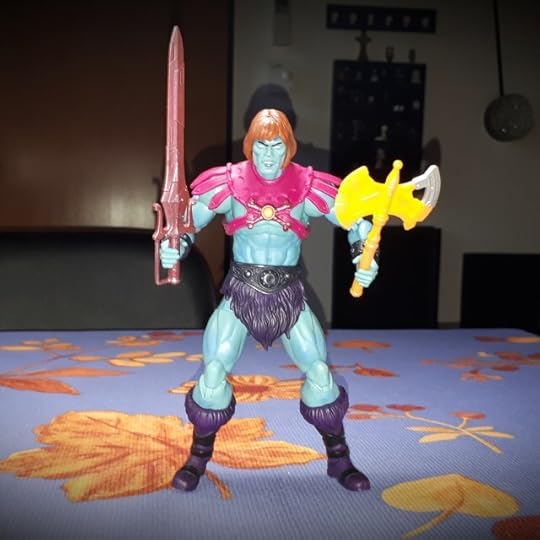
Faker is ready to conquer Eternia for Skeletor. I like this version of the character a lot, not just because of the striking colour scheme, but because his sword and axe aren’t just repaints of He-Man’s weapons, but look worn and cobbled together, adding to the overall appearance of Faker as a cut price He-Man knock-off.
Faker is a popular character (and has featured in one of my Masters-of-the-Universe-Piece Theatre photo stories before). Fans like him because of his striking colour scheme and Mattel likes him because he is cheap to make. However, he’s also a rather absurd character, because he is about the least convincing robot doppelganger ever. And indeed, whenever he has appeared in the cartoons or comics (most recently in Masters of the Universe Revelation), he’s usually depicted as an actual robot doppelganger of He-Man with steel underneath. There actually is a Masterverse version of the Terminator type Faker that appeared in Revelation, though I don’t have that figure.
As for why Faker looks the way he does, the real world reason is that some Mattel designer forty years ago thought a blue and orange He-Man looked cool. As for the in universe reason, well, here is one potential answer:
Artistic LicenseSnake Mountain, Tri-Klops’ workshop:
“Behold my new robot doppelganger of He-Man, Lord Skeletor. Those accursed Masters of the Universe will never know what hit them, when we plant this Faker in their midst. And now arise, my Faker.”
“I Am He-Man.”
“Is he not glorious, Lord Skeletor? I daresay he is my best invention yet.”
“Why is he blue?”
“Excuse me, boss?”
“He-Man is not a Gar. So why is he blue?”
“He-Man also doesn’t have red hair. Or creepy blank eyes. Or a sword riveted together from randoms bits of trash.”
“I… I don’t understand, boss.”
“You do know the difference between humans and Gar, don’t you, Tri-Klops?”
“Yes, Gar have a two point five lower body temperature on average.”
“Gar are blue. Humans are beige and brown. So why is your robot He-Man blue?”
“Listen, boss, I’m blind and only perceive heat signatures through my visor. I don’t know what colour anything is supposed to be.”
“Sigh. Let me guess. You got Trap Jaw to help you paint your fake robot He-Man.”
“Yup, Lyn. Tri-Klops built him and I painted him. Isn’t he awesome?”
“And why, pray tell, did you paint the He-Man robot double blue, Trap Jaw?”
“Uhm, artistic license, boss. I like bright colours and He-Man is just beige and tan and boring. And besides, Gar are prettier than humans. That’s the reasons humans don’t like us, because they’re jealous of our pretty blue skin.”
“Oh please, not another rant about how the poor Gar are so mistreated. As if this world treats anybody well, when they’re not privileged and rich.”
“You blistering boobs! That robot is supposed to look like He-Man and He-Man is not blue. And now fix him or I swear I’ll beat the two of you black and blue. Is that understood?”
“Yes, boss.”
“Idiots. I am surrounded by idiots, Lyn.”
“Now you know how I feel.”
“Hmm, on the other hand, if we deploy our fake He-Man and reveal that he is in truth a Gar, then maybe the people will turn against He-Man like they turned against me…”
“Because obviously the fact that you’re half Gar is the only reason that no one likes you.”
“What were saying, Lyn?”
“Uhm, nothing, Lord Skeletor. Just thinking out loud.”
***
“Well, I like him, Tri-Klops.”
“Shut up, Trap Jaw. This is all your fault.”
***
As established in the 2002 cartoon, Tri-Klops’ vision is enhanced by his visor, giving him infrared and X-ray vision, but without it, he is blind. This can be seen in one episode, where all sorts of electrical systems, including Tri-Klops’ visor, malfunction and Tri-Klops is shown bumping into walls and stalgamites in Snake Mountain.
The 2002 cartoon also established Tri-Klops as Skeletor’s chief engineer and inventor, a role that Trap Jaw fills in the Filmation cartoon and the recent Netflix CGI cartoon. At any rate, Tri-Klops and Trap Jaw are Skeletor’s tech guys, so it makes sense that they would build Faker.
Gar is the name of the blue-skinned inhabitants of Eternia. Skeletor/Keldor is the most famous Gar (half Gar, actually, since he is the son of King Miro and a Gar woman), but there are several others such as Sy-Klone and Kronis a.k.a. Trap Jaw.
There have been blue-skinned people on Eternia since the Filmation cartoon and the early comics. However, the name “Gar” does not show up until much later. I always assumed that it originated in the 2002 cartoon, which not only introduced Keldor as Skeletor’s original identity, but also gave names to many of the Eternian races. But while there is an episode set on a largely deserted island called Anwat Gar, whose magical artefacts are protected by Sy-Klone, it is never said anywhere in the 2002 show that Gar is name of the blue-skinned Eternians or indeed anything other than the name of the island.
The name “Gar” for the blue-skinned people of Eternia may have originated with the characters bios and mini-comics of the Masters of the Universe Classics toyline, where a lot of character names and terms come from. But as far as I can tell, the blue-skinned people of Eternia are first referred to as Gar in the 2012 DC Comics run, which also established that the reason the Gar are disliked is because some of them rebelled against King Grayskull and murdered him. Oddly enough, this completely contradicts the 2002 cartoon, where King Grayskull is killed in battle with Hordak.
In the comics, the Gar are banished to Anwat Gar and the island is declared off limits to the rest of Eternia, until Adam and Adora travel there and Adam, who is king at this point, decides that he is not okay with banishing an entire race of people to a small island because of something that may or may not happened centuries ago and lifts the decree. Which is totally what Adam would do. Meanwhile, Adora, who has only just shaken off her Horde conditioning and hasn’t quite gotten the hang of this heroism thing yet, is frequently frustrated that Adam constantly interrupts their quest to rescue random Eternians.
Of course, King Miro was also shipwrecked on Anwat Gar many years before and even had a relationship and a baby – the future Prince Keldor a.k.a. Skeletor – with a local woman, but he never used his position to actually help the Gar. In fact, King Miro, who is portrayed as a kindly elderly man in his two appearances in the Filmation cartoon, looks more and more like an arsehole, once it was established that Keldor/Skeletor is Randor’s half-brother. Keldor clearly didn’t get all the bad traits from his mother.
I had another Masterverse figure arrive on the same day as Faker, namely Grizzlor, henchman and prison warden of the Evil Horde, who is basically a giant four-fingered alien gorilla. So of course, I put them opposite each other:
Bonus: Faker meets Grizzlor“I’m He-Man.”
“No, you’re not. You’re just some bargain basement knock-off.”
“I have a sword. And an axe.”
“So what? I have an axe, too, and mine is bigger.”
***
And that’s it for today, folks. I hope you enjoyed this Masters-of-the-Universe-Piece Theatre Photo Story, because there will be more.
Disclaimer: I don’t own any of these characters, I just bought some toys, took photos of them and wrote little scenes to go with those photos. All characters are copyright and trademark their respective owners.
June 29, 2023
Indie Speculative Fiction of the Month for June 2023

It’s that time of the month again, time for “Indie Speculative Fiction of the Month”.
So what is “Indie Speculative Fiction of the Month”? It’s a round-up of speculative fiction by indie and small press authors newly published this month, though some May books I missed the last time around snuck in as well. The books are arranged in alphabetical order by author. So far, most links only go to Amazon.com, though I may add other retailers for future editions.
Once again, we have new releases covering the whole broad spectrum of speculative fiction. This month, we have epic fantasy, urban fantasy, cozy fantasy, fantasy romance, paranormal mystery, space opera, military science fiction, Cyberpunk, Steampunk, weird western, horror, dwarves, elf assassins, alien invasions, airships, banished sorceresses, murderous ghosts, living stars, haunted funhouses, celibate monster hunters, crime-busting witches, crime-busting ghosts and much more.
Don’t forget that Indie Speculative Fiction of the Month is also crossposted to the Speculative Fiction Showcase, a group blog run by Jessica Rydill and myself, which features new release spotlights, guest posts, interviews and link round-ups regarding all things speculative fiction several times per week.
As always, I know the authors at least vaguely, but I haven’t read all of the books, so Caveat emptor.
And now on to the books without further ado:
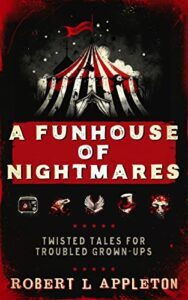 A Funhouse of Nightmares: Twisted Tales for Trouble Grown-ups by Robert L. Appleton:
A Funhouse of Nightmares: Twisted Tales for Trouble Grown-ups by Robert L. Appleton:
Step into a twisted realm where the lines between reality and the bizarre blur, and prepare to be captivated by “A Funhouse of Nightmares: Twisted Tales For Troubled Grown-ups.”
In this macabre anthology, five tales transport you to surreal landscapes of the mind, where the strange, supernatural, and occult intertwine with a touch of humor and absurdity.
In “Static,” a troubled young man discovers that the static on his radio holds prescient advice, leading him on a dark and unpredictable path. “Toad” introduces us to a lovely young woman possessed by the spirit of an Inca priest, as she plots to destroy her unfaithful spouse in a spine-chilling quest for vengeance.
Witness the fall and redemption of Beelzebub in “The Book of Fallen Angels,” a haunting exploration of divine rebellion and the pursuit of redemption. Prepare for a poignant tale in “Tears For Topsy,” where a circus clown makes a fateful exchange, sacrificing his soul for happiness in a world consumed by darkness.
Finally, embark on a mind-altering journey with “Mould,” as a hallucinogenic truffle transports a young woman into a mesmerizing realm inhabited by anthropomorphized woodland creatures.
These stories weave together elements of the supernatural, occult, and the absurd, delivering a captivating experience that oscillates between unease and laughter. Described as modern Kafkaesque, “A Funhouse of Nightmares” promises to entertain, thrill, and leave you questioning the boundaries of reality. Get ready for a rollercoaster ride through the bizarre and delightful, where nothing is quite as it seems, nor should it be…
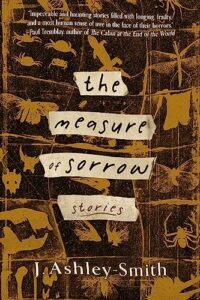 The Measure of Sorrow by J. Ashley-Smith:
The Measure of Sorrow by J. Ashley-Smith:
Shirley Jackson Award-winning author J. Ashley-Smith’ s first collection, The Measure of Sorrow, draws together ten new and previously acclaimed stories of dark speculative fiction. In these pages a black reef holds the secret to an interminable coastal limbo; a father struggles to relate to his estranged children in a post-bushfire wilderness; an artist records her last days in conversation with her unborn child; a brother and sister are abandoned to the manifestations of their uncle’ s insanity; a suburban neighbourhood succumbs to an indescribable malaise; teenage ravers fall in with an eldritch crowd; a sensitive New Age guy commits a terminal act of passive-aggression; a plane crash opens the door to the Garden of Eden; the new boy in the village falls victim to a fatal ruse; and a husband’s unexpressed grief is embodied in the shadows of a crumbling country barn. Intelligent and emotionally complex, the stories in The Measure of Sorrow elude easy classification, lifting the veil on the wonder and horror of a world just out of true.
Half-dwarven craftswoman, enchanter, and badass hammer-wielder Matti Puletasi has achieved most of her goals and even found the love of the handsome elf assassin Sarrlevi.
Unfortunately, there’s still a bounty on her head. That makes it hard to return to a normal life, start a family, or even visit the Coffee Dragon without being shot at.
Worse, one of Sarrlevi’s old elven lovers shows up, hinting of changes back home that mean his exile could be lifted and his nobility returned—if only he’ll dance to her tune.
Matti knows Sarrlevi loves her but worries he’ll be tempted. A chance to return home and be a hero instead of an outcast. Who wouldn’t long for that?
 Seer of Epera by Christine Cazaly:
Seer of Epera by Christine Cazaly:
What will you give to save the future?
At the Court of Skies, Theda Eglion, Chief Librarian, is famed for three things.
Her acerbic tongue, her profound knowledge, and her beautiful, charismatic daughter, Briana.
Despite the status granted to members of the Blessed, Theda has a closely guarded secret.
She’s the Seer of Epera, blessed by her God with the gift of Farsight. Her role – to protect the nation’s magic and the Blessed population who wield it.
But when her daughter falls under the beguiling spell of an ambitious young courtier, Theda will need every ounce of her faith to ensure the future of magic.
Even if it costs her everything she holds most dear.
The War Is Over. We Lost
The war in Hasra is over. A monstrous puppet sits upon the throne. Valys has fallen, and the Praetor rots in prison while his daughter remains a public hostage. Calmora is under Khonsu’s rule, the dragonflight’s plaything. Worse, my aunt and the other demon princes have fostered a new religion, which is sweeping the west.
Our only choice was to flee to Olivantia, where we huddle with the dreadlords who are under assault by the Tree of Blood and its armies of consumed. Things have never looked so grim. I have no more tombs. No more miracles from friendly gods.
Yet I do not stand alone. I’ve gathered my friends. We will prevail. We must. The cycle depends upon it.
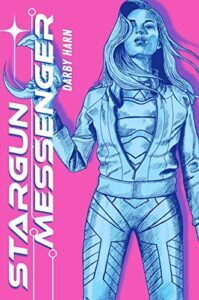 Stargun Messenger by Darby Harn:
Stargun Messenger by Darby Harn:
Astra Idari must keep the last living star alive in a galaxy lost to shadows.
Astra Idari is a mess. She drinks too much, remembers too little, and barely pays for it all as a Stargun Messenger. She hunts down thieves who steal filamentium, the fuel that allows for faster-than-light travel. When Idari meets Gen Emera, she meets the girl of her dreams and the last living star. There’s just one problem.
Filamentium is only found in the blood of living stars.
Once Idari knows the truth, she faces a stark choice. Either she turns Emera over to her employers who control the filamentium monopoly or risks everything to help Emera fulfill her quest to save her people. The choice should be simple, but it’s not losing her life that terrifies Idari. It’s finally living. Idari knows she’s human despite outwardly appearing to be an android with a failing memory stitched together by her ship’s irascible AI, CR-UX. She’s been just getting by for longer than she remembers, assured in her humanity, but not enough to risk it. If she does now, she may lose her life.
If she doesn’t, she may never live.
 Poltergeist Rider by Lily Harper Hart:
Poltergeist Rider by Lily Harper Hart:
Spring has hit Casper Creek. That means construction on Hannah Hickok’s future home with her fiancé Cooper Wyatt is finally commencing, and work on the new restaurant in town is getting close to completion. Everything should be perfect in her world.
There’s just one little problem.
A ghost from the past has decided to haunt the present…and he’s not a normal ghost. He’s riding a ghost horse. And, oh yeah, he’s firing a gun. Ghost bullets shouldn’t be a threat, and yet these bullets are killing people.
A scarf left at one of the scenes leads Hannah to look at the area’s bootlegger past. It seems there’s a cabin not far from Casper Creek, and their ghost might have originated from there. Where has he been for the past century, though? And, more importantly, why is he back?
As the bodies begin to stack up, Hannah begins to suspect they’ve got more than a murderous ghost on her hands. The human element of the equation is impossible to uncover, however.
Hannah is determined to find answers. She just needs a place to start looking.
It’s a fight to the finish, and ghost bullets aren’t the only thing Hannah and her friends need to worry about. There’s a new evil afoot…and this time, the gang might not be up to the challenge.
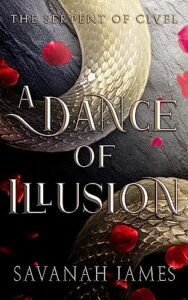 A Dance of Illusion by Savanah James:
A Dance of Illusion by Savanah James:
The Drakari call him their savior.
For 3,000 years, elven aristocrats have subjugated their hybrid counterparts, suppressing their magick and forcing them to live in the slums of great imperial cities.
Twins Vivani and Valyn Tyrea refuse to perpetuate this gory cycle. To destroy a tyrannical body, they know they must sever the head.
While born of noble, elven blood, something else surges through their veins, allowing them to hide in plain sight. Valyn is determined to conquer the empire through cunning and manipulation. Vivani longs to save her people. Together, they must combine their strengths if they hold any hope of survival.
When a rebel group of drakkin hybrids surge from the slums of the capital, Vivani and Valyn are introduced to Kraven Crausya who maintains connections to the rebel undergrounds. Through him, they learn of the Serpent of Civel… a legend to the hybrids and their proclaimed savior. He was thought to be long dead, but the whispers of the oppressed tell a different tale.
When facing the Drakari’s so-called savior, will Vivani find the peace she hopes for? Or will a shattered illusion cause her to choose between the life she has built and following her conscience?
 Murder at the Pontchartrain by Kathleen Kaska:
Murder at the Pontchartrain by Kathleen Kaska:
I’m Sydney Lockhart. I solve murders, most of which I’m the primary suspect. My fiancée, Ralph Dixon, and I came to New Orleans to get married. Instead, he’s been arrested for a double murder, and I’m hunting for the real killer. Assisting me are a twelve-year-old voodoo queen, a ghost detective, and my crazy cousin Ruth. Wish me luck. I’ll need it.
 The Alien Anomaly by Amanda M. Lee:
The Alien Anomaly by Amanda M. Lee:
Charlie Rhodes has seen it all. Witches. Ghosts. The Chupacabra. Now she’s about to head down a different road … and it’s one she’s not prepared for.
When three bodies show up drained of fluids in Roswell, New Mexico, the Legacy Foundation is sent out to investigate. The assumption, because of where it happened, is aliens. Charlie isn’t so sure, though.
As the team leader, Chris is gung-ho to chase visitors from another planet. That means camping out at Bottomless Lakes Park, something nobody but Chris is keen to do. Between alien enthusiasts whooping it up at the far end of the park and Charlie’s belief that she’s being haunted by a ghost, the group has their hands full.
Roswell is a weird place. It’s also the sort of place where secrets can be hidden for a very long time. The caves beneath Bottomless Lakes run deep. There just might be a different sort of monster hiding there, however.
Charlie knows she has a big fight in front of her. This trip will help her get ready … as long as she survives the darkness that’s threatening to take over the area.
Charlie’s past ghosts are about to collide with her future dreams. The collision promises to be out of this world.
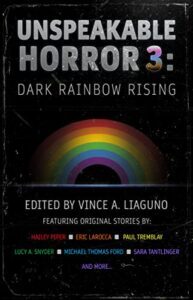 Unspeakable Horror 3: Dark Rainbow Rising, edited by Vince A. Liaguno:
Unspeakable Horror 3: Dark Rainbow Rising, edited by Vince A. Liaguno:
The third terrifying volume in the award-winning anthology series of original queer horror.
Like the final girl in a slasher film, the LGBTQIA community knows first-hand what it’s like to fight for its survival. Beaten and bloodied after an extended chase scene through modern-day politics and the courts, we think we’ve triumphed and conquered our oppressors. We breathe a little easier knowing our rainbow is ascending in the distance. But—like the indestructible slasher villain—our enemies rise up again and again, as if on a looping third-act jump scare. It’s a seemingly never-ending return to battle as the pendulum of progress swings back.
In this third volume of the award-winning anthology series, the darkest minds from both the LGBT+ and horror literary communities join forces to bring readers an all-new collection of terrifying tales from that line on the horizon where the dark rainbow rises.
Stories by Chad Helder, Hailey Piper, Mathew L. Reyes, A.P. Thayer, J. Daniel Stone, Yah Yah Scholfield, Oliver Nash, Holly Lyn Walrath, Paul Tremblay, Carmilla Voiez, James Cato, Lucy A. Snyder, Maxwell I. Gold, Zachary Rosenberg, Matthew Blain-Hartung, Maryse Meijer, Vincent Kovar, CG Inglis, Craig Laurance Gidney, Dan Coxon, Kaitlin Tremblay, Michael Thomas Ford, Craig Brownlie, Amanda M. Blake, Sara Tantlinger, and Eric LaRocca. Edited by Vince A. Liaguno.
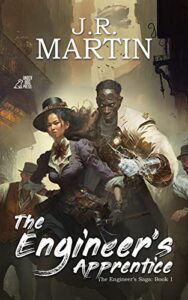 The Engineer’s Apprentice by J.R. Martin:
The Engineer’s Apprentice by J.R. Martin:
This alternate-history steampunk western contains action, adventure, magic, and a mystery that will change the Western Native Lands forever.
In 1860s Dallas, Texas, Annie Sakdavong has just graduated top of her class from college as a steam engineer but must still do an apprenticeship with a master steam engineer. No man is willing to take her, and she fears she may have to become a Sword Maiden for a merchant of her father’s choosing when she runs into an African man who wants an apprentice as much as she needs a master, Issa Obasi.
One of the premier steam engineers of the age, Issa wants to leave a legacy in the form of apprentices and the publication of groundbreaking research combining rune magic with steam power. These two sources of power are at odds with each other, but Issa sees there could be a better way to unite them.
Their world changes when a Native American from the Western Native Lands who can walk through walls comes to steal that research and destroy Issa’s laboratory during a fight. After seeking help from the police, Issa and Annie are left to fend for themselves when the police don’t want to help the black man and the Asian woman with the investigation.
Now, their adventure takes them to the Western Native Lands while death tolls rise and villains close in on Issa and Annie’s life and work. As they get closer to the truth, will they overcome dangerous enemies and their own self-doubts to win the day?
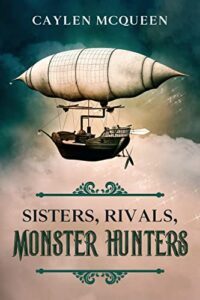 Sisters, Rivals, Monster Hunters by Caylen McQueen:
Sisters, Rivals, Monster Hunters by Caylen McQueen:
Imagine 30 strapping young men, all stuck in a convent and all hopelessly pure. It sounds like Kathleen Laveau’s ultimate fantasy… until she crashes her airship in the middle of their sacred abode.
Kathleen and her sister, Cinnabar, find themselves stranded in a cursed land, where the dead rise from their graves, dragons swoop down from the sky, and metal monsters wreak havoc. But that’s not even the worst of it. The sisters soon realize the convent’s chastity is being strictly enforced by “The Grand Mother,” a fussy guardian who won’t let Kathleen anywhere near the innocent boys.
Undeterred, Kathleen takes matters into her own hands, flirting with as many boys as she can, much to the chagrin of “The Grand Mother.” In the middle of the flirtation fest, the sisters meet the rebellious pyromaniac, Wendall. In him, they might have gotten more than they bargained for.
Will Kathleen and Cinnabar survive the cursed land and the fires of the convent? Will they succumb to the boys’ innocent charms, or will “The Grand Mother” put an end to their shenanigans? Find out in this madcap steampunk adventure!
 Forsaken Commander by G.L. Ogden:
Forsaken Commander by G.L. Ogden:
Humanity’s only hope is the commander they spurned.
Once, Master Commander Carter Rose was the Union’s secret weapon. An augmented, bio-engineered officer in command of the most powerful warship ever devised by human minds, Rose brought them victory against the post-human Aternien Empire.
Then they cast him aside.
A century later, living alone on a distant forest moon, feared and forsaken by the people he fought to save, Rose has grown bitter and resentful, while his superhuman body refuses to age.
When Major Carina Larsen seeks his help to save Earth from becoming the last frontier of humanity, Rose is reluctant to return to duty. Until Larsen reveals the real peril: the Aterniens are on the rise again, hell-bent on revenge.
And after a century of peace, the Union has forgotten how to fight.
But even if Rose can recover his marooned warship and assemble a crew, his allegiance is now a valuable commodity — and a secret weapon is only ever as dangerous as those who wield it…
 At the Winding Path’s End by Stew Shearer and Carolyn Smith:
At the Winding Path’s End by Stew Shearer and Carolyn Smith:
Curl up with fantasy poet Stew Shearer in this fully illustrated collection of cozy poems.
Poet Stew Shearer has written cozy fantasy poetry for years. Now, Wyngraf is proud to release a chapbook featuring the best of Stew’s work, including some brand-new, never-before-seen poems! Even better, every single poem features an original illustration by artist Carolyn Smith.
These twenty-four little celebrations of hearth and backpack are packed with beauty, humor, and heart.
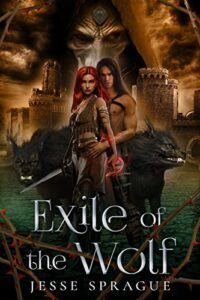 Exile of the Wolf by Jessie Sprague:
Exile of the Wolf by Jessie Sprague:
She’s a one man, one country type of sorceress.
Too bad she’s been banished from both.
Exiled from for aiding enemy nations, Ziza hasn’t seen Vaash—the man she loves and the heir to the Bouraster throne—in a year. She’s accepted that the only way home is to let the wasteland take her. But fate has other plans and instead of death, she finds the emerging nation of Slyke. Here Ziza encounters Iroguese, an evil spirit who seeks a way to reenter their world in the flesh. He offers her a deal that is too good to be true: Give him the body of Slyke’s ruler to inhabit and he will broker an alliance that can get Ziza home.
Meanwhile, Vaash is tasked with eradicating Slyke, the upstart nation on Bouraster’s borders. To prevent an uprising, he needs to show his people he’s strong enough to rule, but when he discovers Ziza sheltering with his enemies, he’s torn between his duty and his desire for the sorceress.
They must both choose whether to follow the paths laid out for them or to forge a new way… and either way they face the deadly consequences of their broken vows.
A homeworld is not always home.
Family is not always blood.
Enemies are not always who you expect.
Captain Evridiki “EB” Bardacki wants nothing more than to quietly ride off into the sunset with his fiancé, his crew, and his adopted daughter, Trace. But when a strange message brings them all to Trace’s home star system of Icem, it turns out the fragments of the crime syndicate that kidnapped her have one last trick to play.
An old enemy has betrayed their former compatriots and set into motion events that may allow EB to save hundreds of children like his daughter from the traffickers who stole them away. When that enemy shows up dead, the crew of Evasion must decide whether to chase the leads left by a dead monster or protect themselves.
Those leads will take EB and Trace into the dens of crime lords, the homes of judges, the hearts of secret bases—and the presence of the foster parent Trace ran away from at the beginning of everything…
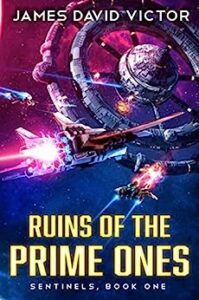 Ruins of the Prime Ones by James David Victor:
Ruins of the Prime Ones by James David Victor:
If you’re gonna save the galaxy, you might as well get paid for doing it.
Captain Melias Volery is a Sentinel, a warrior who travels the galaxy protecting those that can’t protect themselves. If they can afford to pay for his services. Whether you call them mercenaries or heroes, there’s no denying their effectiveness, but even these experienced warriors may be in over their head in the ruins of the Prime Ones. Can Melias and his crew unravel the secrets of this long lost race and save the galaxy from an ancient alien power trying to destroy the galaxy?
Ruins of the Prime Ones is the first book in the Sentinels series. If you like sci-fi adventures, space battles with complex alien invaders, and unexpected twists in humanities exploration of the stars, this could be your new favorite series.
June 28, 2023
Indie Crime Fiction of the Month for June 2023

Welcome to the latest edition of “Indie Crime Fiction of the Month”.
So what is “Indie Crime Fiction of the Month”? It’s a round-up of crime fiction by indie authors newly published this month, though some May books I missed the last time around snuck in as well. The books are arranged in alphabetical order by author. So far, most links only go to Amazon.com, though I may add other retailers for future editions.
Our new releases cover the broad spectrum of crime fiction. We have hardboiled mysteries, cozy mysteries, small town mysteries, historical mysteries, Jazz Age mysteries, 1950s mysteries, 1960s mysteries, paranormal mysteries, crime thrillers, adventure thrillers, action thrillers, police officers, FBI agents, amateur sleuths, assassins, serial killers, drug cartels, revenge, murderous ghosts, alien invasions, deadly book clubs, crime-busting witches, crime-busting socialites, crime-busting seamstresses, crime-busting dogs, murder and mayhem in London, Seattle, Mobile, New Orleans, the British Seaside, New Zealand, the Caribbean and much more.
Don’t forget that Indie Crime Fiction of the Month is also crossposted to the Indie Crime Scene, a group blog which features new release spotlights, guest posts, interviews and link round-ups regarding all things crime fiction several times per week.
As always, I know the authors at least vaguely, but I haven’t read all of the books, so Caveat emptor.
And now on to the books without further ado:
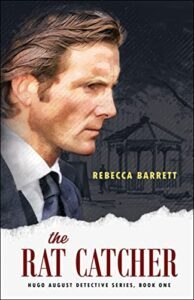 The Rat Catcher by Rebecca Barrett:
The Rat Catcher by Rebecca Barrett:
November in Mobile, Alabama is a long way from the horrors of the sweltering jungles of Vietnam.
In the fall of 1968, what passes for winter is coming to the heart of the deep South. And so are death, deception, draft evasion, drugs, and heartache.
Hugo August has come home, or at least the nearest thing to a home he has ever known. As a newly minted detective in the police department, he must investigate the murder of a wealthy socialite.
The appearance of Bebe Prescott, the forbidden fruit of Hugo’s late-night longings and lifelong obsession, complicates the case. A product of the Catholic orphanage, Hugo is well aware of the social stratification of Mobile society. Bebe is as far removed from his reality as the moon, and yet, they have always had chemistry.
Spurred by a desire for justice and to prove his worth, Hugo must wade through the complications of the wealthy family’s business, social connections, dark secrets, and often tragic history while guarding his own demons.
 Murder on the Downs by Beth Byers:
Murder on the Downs by Beth Byers:
Jack and Ham are facing the loss of a dear friend. A final visit, a final goodbye is ahead with the limited time left.
Soon, however, things are amiss. What seems innocent becomes sinister as the days pass, and they start to wonder just what they’ve fallen into.
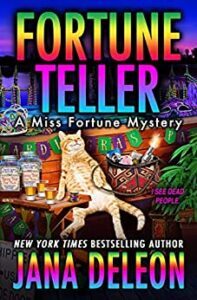 Fortune Teller by Jana DeLeon:
Fortune Teller by Jana DeLeon:
With Carter off on a military mission, there’s a new sheriff in town, and Fortune, Ida Belle, and Gertie have been tasked with not interfering. But then a young girl is pulled out of the swamp, unconscious and with no memory of how she got there. And when no one comes to claim her, Fortune knows they have to help.
For decades, a mysterious group known only as the Brethren has been rumored to live deep in the swamp, their contact with civilization rare. Some suggest the girl might have been one of them, but if so, why was she alone in the swamp in the middle of the night? Swamp Team 3 is on the case, but long-buried secrets like to stay that way, and finding the Brethren proves to be a difficult and dangerous task. The deeper they dig, the more pieces of the puzzle they expose, but can they put the pieces together in time to save the girl?
 Vengeance Strike by Brian Drake:
Vengeance Strike by Brian Drake:
Betrayal puts Sam Raven on a course for revenge.
It was the kind of job Raven couldn’t turn down. A daughter dead from a drug overdose, a father who wants the man responsible dead—and not only the street pushers. Kendrick Ward wants the cartel boss responsible removed from existence. Raven agrees, and he and his team of mercenaries fly into Colombia. Mission: kill narco boss Martin Sevilla and crush his empire.
But when the job is done, Ward pulls a double cross, and makes a big mistake. Only Raven survives the ambush.
Now Raven is ready to give back twice as much as received. He crashes through the heart of the betrayal to find a conspiracy of epic proportions, American Big Business and other cartel bosses working hand-in-hand. Raven’s fighting a war without end, and the circle of violence spares no one. It’s go time.
 Murder by Multiples by Rachel Ford:
Murder by Multiples by Rachel Ford:
Quiet Fenwood-On-Sea is the perfect place for an heiress with secrets to hide. Or a killer.
Beautiful heiress Meredith Thatch married for love, and scandalized her community in the process. But her neighbors don’t know the half of it. These days, she and spouse Alec keep a low profile, managing her hospital for recovering soldiers and invalids – and growing the finest roses in the county.
But when the most despised landowner in the area winds up dead shortly after feuding with the hospital, the finger of suspicion turns on the couple. And that’s only the first murder.
With a Scotland Yard inspector asking uncomfortable questions and a killer on the loose, they need to solve the crime sooner rather than later. But how can they find a killer when there are suspects everywhere they turn, and motives all over the place?
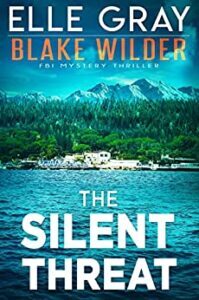 The Silent Threat by Elle Gray:
The Silent Threat by Elle Gray:
After the bodies of six young girls were discovered in a shipping container that had been dumped in a scrapyard, FBI agent Blake Wilder is summoned onto the horrific scene. A closer inspection of the bodies reveals strange markings, similar to Spenser’s victims in Sweetwater Falls.
Could it be the markings used by the ruthless Yokai Syndicate, led by the shadowy figure called Enenra? The Syndicate responsible for the disappearance and death of hundreds of young girls over the years.
Fearing blood in the streets and containers full of young girls’ bodies popping up everywhere, Blake reluctantly turns to her old ally, Fish, for help.
As betrayal and deceit surrounds her at every turn, Blake isn’t sure who she can trust. With the help of her former colleague Spenser Song, and Caitlin Tanaka will Blake be able to put an end to The Syndicate’s sadistic crimes for good?
It seems to be reunion time in the Seattle field office for Blake Wilder. Unfortunately, with death knocking on their doorstep the reunion may be short lived…
 Poltergeist Rider by Lily Harper Hart:
Poltergeist Rider by Lily Harper Hart:
Spring has hit Casper Creek. That means construction on Hannah Hickok’s future home with her fiancé Cooper Wyatt is finally commencing, and work on the new restaurant in town is getting close to completion. Everything should be perfect in her world.
There’s just one little problem.
A ghost from the past has decided to haunt the present…and he’s not a normal ghost. He’s riding a ghost horse. And, oh yeah, he’s firing a gun. Ghost bullets shouldn’t be a threat, and yet these bullets are killing people.
A scarf left at one of the scenes leads Hannah to look at the area’s bootlegger past. It seems there’s a cabin not far from Casper Creek, and their ghost might have originated from there. Where has he been for the past century, though? And, more importantly, why is he back?
As the bodies begin to stack up, Hannah begins to suspect they’ve got more than a murderous ghost on her hands. The human element of the equation is impossible to uncover, however.
Hannah is determined to find answers. She just needs a place to start looking.
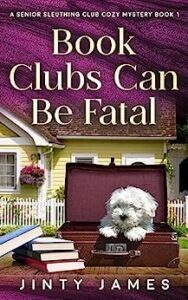 Book Clubs Can Be Fatal by Jinty James:
Book Clubs Can Be Fatal by Jinty James:
Can senior sleuth Martha and her cute puppy Teddy discover who killed a member of their book club – before it’s too late?
When Pru, the new assistant librarian at the Gold Leaf Valley library, knocks on Martha’s door asking to be her roommate, she has no idea she’ll soon become a member of the Senior Sleuthing Club, despite being a lot younger than Martha.
In charge of setting up a new book club at the library, Pru is worried not enough people will join. So Martha agrees to come, although she dislikes the book they have to read.
When Pru and Martha stumble across the dead body of one of the book club members, Martha decides they must investigate, along with her fluffy white puppy, Teddy!
They snoop around the Gold-Rush era small town, and visit their friends Annie, Lauren, and Zoe at the Norwegian Forest Cat Café to discuss the case.
But when they respond to an anonymous note, the three of them find themselves in peril! Can they discover the killer and escape in time, before it’s too late?
 Murder at the Pontchartrain by Kathleen Kaska:
Murder at the Pontchartrain by Kathleen Kaska:
I’m Sydney Lockhart. I solve murders, most of which I’m the primary suspect. My fiancée, Ralph Dixon, and I came to New Orleans to get married. Instead, he’s been arrested for a double murder, and I’m hunting for the real killer. Assisting me are a twelve-year-old voodoo queen, a ghost detective, and my crazy cousin Ruth. Wish me luck. I’ll need it.
 The Alien Anomaly by Amanda M. Lee:
The Alien Anomaly by Amanda M. Lee:
Charlie Rhodes has seen it all. Witches. Ghosts. The Chupacabra. Now she’s about to head down a different road … and it’s one she’s not prepared for.
When three bodies show up drained of fluids in Roswell, New Mexico, the Legacy Foundation is sent out to investigate. The assumption, because of where it happened, is aliens. Charlie isn’t so sure, though.
As the team leader, Chris is gung-ho to chase visitors from another planet. That means camping out at Bottomless Lakes Park, something nobody but Chris is keen to do. Between alien enthusiasts whooping it up at the far end of the park and Charlie’s belief that she’s being haunted by a ghost, the group has their hands full.
Roswell is a weird place. It’s also the sort of place where secrets can be hidden for a very long time. The caves beneath Bottomless Lakes run deep. There just might be a different sort of monster hiding there, however.
Charlie knows she has a big fight in front of her. This trip will help her get ready … as long as she survives the darkness that’s threatening to take over the area.
Charlie’s past ghosts are about to collide with her future dreams. The collision promises to be out of this world.
 The Last Survivors by A.J. Rivers:
The Last Survivors by A.J. Rivers:
When Dean receives a distraught phone call from his ex-girlfriend.
He rushes to her home to find a horrific and dreadful scene…
A ransacked house and her bloodied body lying on the floor.
As the police and her husband arrive at the scene, Dean learns that his ex’s son is also missing.
While Dean searches for answers behind her death, a bombing kills a friend from his days in the military.
At the memorial service, Dean has to confront people he hasn’t seen in years while facing memories of a tragic event that left them all scarred.
The situation takes a darker turn as mysterious classified documents appear in his hotel room, leading to even grimmer twists.
With the body count rising, it seems someone is after the survivors for their secrets.
Dean just has to stay alive long enough to figure out who and why…
 Liable Charity by Wayne Stinnett and Kimberli A. Bindschatel:
Liable Charity by Wayne Stinnett and Kimberli A. Bindschatel:
Charity Styles had been the catalyst for the demise of many. But in the past that usually meant the end of a human life. As an assassin for the CIA, it came with the territory.
But this time she feels responsible for the end two of her friend’s relationship.
She sets out on a voyage to find one of the partners in the hopes of rectifying the rift she helped create. Along the way, she encounters a deadly foe, bent on becoming rich regardless of how many must suffer or die.
Charity finds her friend but before they can reconcile the problem, they must join forces with an animal rights activist to rescue an innocent woman from a Mexican cartel involved in the trafficking of endangered wildlife.
Facing down armed and powerful cartel members will be child’s play compared to the fight yet to come when Charity admits what she’s done.
It’s the height of summer in Campeche, but when Charity Styles is around, things tend to get even hotter.
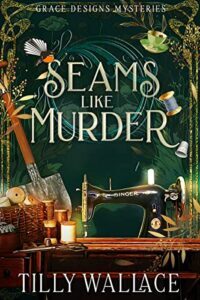 Seams Like Murder by Tilly Wallace:
Seams Like Murder by Tilly Wallace:
There are two things that can’t talk—moving pictures and dead showgirls…
1920, Wellington, New Zealand. Grace Devine is poised to build her thriving dress design business as the twenties begin to soar. But when a fashionable client is murdered, suspicion falls on Grace as the last person to see Agatha alive.
As wary clients cancel and business begins to fail, Grace decides there’s only one way to prove her innocence and save her career…this seamstress will turn sleuth to find who really murdered the showgirl.
The more she learns, the more she uncovers of the darker side of the dead woman’s personality. Agatha liked to collect secrets and use them against people. But what target snapped that fatal night? Can Grace stitch together the clues before her life is torn apart…
June 25, 2023
Masters-of-the-Universe-Piece Theatre Pride Month Special: “Ambush in the Mystic Mountains”
It’s time for another Masters-of-the-Universe-Piece Theatre photo story. The name “Masters-of-the-Universe-Piece Theatre” was coined by Kevin Beckett at the Whetstone Discord server.
Last year, I posted a Masters-of-the-Universe-Piece Theatre Pride Month Special called “Fisto’s Significant Other”, in which Fisto and Ram-Man announce that they are a couple. This is only my head canon BTW, but the various cartoons hint quite strongly that Fisto as well as various other heroic warriors are not straight. And besides, they do make a cute couple.

Eternia’s favourite gay couple, Fisto and Ram-Man
Therefore, I decided to do another Pride Month Special featuring fan favourite Malcolm a.k.a. Fisto and his significant other Ram-Man a.k.a. Krass. Especially since I had just picked up the new Masterverse Deluxe Ram-Man figure.
So enjoy…
Ambush in the Mystic MountainsIn the Mystic Mountains:
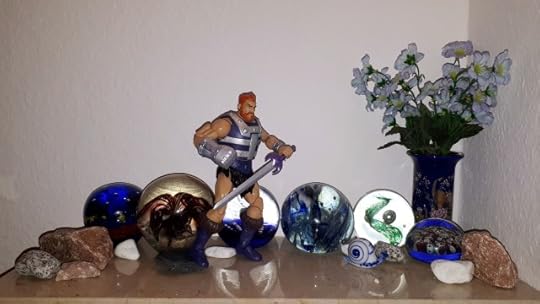
Yes, I included a Delftware snail as a little Easter egg. As a kid, I used to collect snails – real life snails – so a neighbour gave me the Delftware snail as a gift.
“Ah, the Mystic Mountains, my old stomping grounds. Back when I thought that miner was a more viable profession than Master of the Universe. I mean, it’s certainly safer, even with all the cave-ins, glowing evil gems and the occasional Arachnid attack. But there’s no Skeletor, no Evil Horde, no Snake People…”
“Right, who am I kidding? I always knew that I couldn’t just hang up my sword and walk away from my hero days. After all, someone’s got to keep an eye on Duncan and he’s never going to walk away. And Teela, of course. And Prince Adam, since Duncan aparently adopted him. Besides, I like being a Master of the Universe. Okay, not the constant attacks and ever-present danger, but I like hanging out with the other Masters, feasting, drinking, watching Orko’s magic tricks or one of Manny’s performances. And then there’s Krass…
 “Halt! Thou shalt not pass without paying road toll to Whiplash, King of the Caligars.”
“Halt! Thou shalt not pass without paying road toll to Whiplash, King of the Caligars.”
“You’re not King of the Caligars, Whiplash. Your brother Ceratus is and he hates your guts. And now let me pass or eat steel knuckles. Cause this is my holiday and I’m really not in the mood.”
“Oh, I’ll let you pass, once you’ve paid the road toll. And since you’re a Master of the Universe, I’ll give you an extra discount. I’ll only take your head and that iron fist of yours. They’ll look great on my trophy wall.”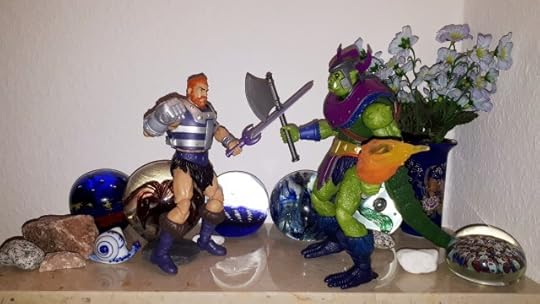 “So you want to fight? Okay, shithead, then eat steel knuckles.”
“So you want to fight? Okay, shithead, then eat steel knuckles.”
“Shut up and fight!”
“No one tells me to shut up. Except my brother Duncan and that’s only because I like him. And now bring it on, arsehole!”
CLASH! CLATTER! SLAM!
“Yeah and fist beats jaw. Say goodbye to those tusks.”
“You’ve got to get close to me first. And you’re not fireproof. And now say goodbye to your head, Fisto.”
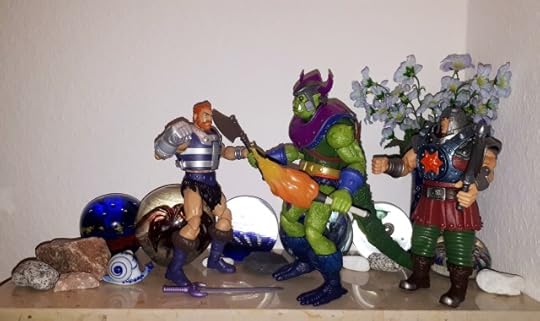 “Hey, that’s my man you’re threatening. Leave him alone or I’ll ram you into the ground.”
“Hey, that’s my man you’re threatening. Leave him alone or I’ll ram you into the ground.”
“Get lost, you puny little man! This is between me and Fisto.”
“If you pick a fight with Malcolm, you pick a fight with me.”
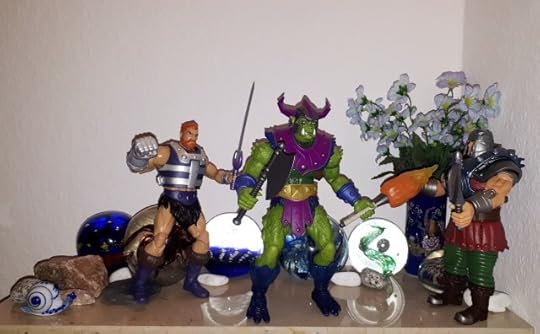 “Oh yeah? Your armour can protect you from my torch, but it won’t protect you from my axe. And your head will look great on my trophy wall as well. Maybe I’ll put it right next to Fisto’s.”
“Oh yeah? Your armour can protect you from my torch, but it won’t protect you from my axe. And your head will look great on my trophy wall as well. Maybe I’ll put it right next to Fisto’s.”
“Oh no, you won’t.”
PUNCH! SLAM!
 “Crap! Two Masters are too much for me alone. I should’ve brought Clawful. Or Beast-Man. But then I’d have to share the loot with them.”
“Crap! Two Masters are too much for me alone. I should’ve brought Clawful. Or Beast-Man. But then I’d have to share the loot with them.”
“Yeah, run away and crawl back to Snake Mountain like the coward that you are.”
“And tell Skeletor that he can lick me in the arse!”*
“Uhm, actually that sounds kind of disgusting, Malcolm.”

Unfortunately, the male Masters of the Universe figures are a bit too bulky to hug or kiss, though they can gaze deep into each other’s eyes.
“Are you all right, Malcolm?”
“I’m fine. Just a few bruises and a dented sword. But what are you doing here, Krass?”
“I was visiting my brother and his family. And since I was here in the Mystic Mountains already, I thought I could join you. Good thing that I did.”
“And it never occurred to you to take me along when you visit your family?”
“Uhm, I never thought you wanted to meet my family. They’re kind of boring and also still sore that I left to join the Royal Guard.”
“They’re your family, so of course I want to meet them. And besides, you know my family.”
“Yeah, because your brother is also my boss. But yes, if you want to meet my family, I’ll take you to see them. They don’t live far away, only beyond that mountain.”
“I’d love to meet them, Krass. And talking of family, I’d better call Duncan to let him know that Whiplash is waylaying travellers in the Mystic Mountains.”
***
In the 2002 cartoon, Malcolm is first seen working as a miner in the Mystic Mountains. Well, actually he’s first seen in a bar, getting drunk and picking fights, but it’s implied that he left the Eternian Guard to become a miner, before running into his brother and the Masters of the Universe during a mission brings him back into the fight and also costs him his hand.
Malcolm’s offer that Skeletor may lick his arse is of course a paraphrase of the famous line that Johann Wolfgang von Goethe wrote for that other iron-fisted warrior, 15th century rebellious German knight Götz von Berlichingen. I have no idea if Götz von Berlichingen was an inspiration for Fisto – and I even asked someone who’d worked on the Masters of the Universe toyline once – but the parallels are notable.
Whiplash, the reptilian Evil Warrior with the mighty tail, is shown to be a member of a subterranean species called the Caligar in the 2002 cartoon, though why a species of aligator people is living in caves rather than in a swamp is never explained.
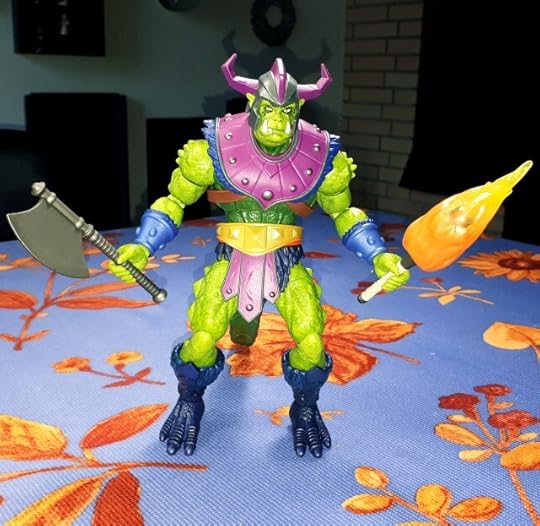
Whiplash ready to take on the world.
I recently found the brand-new Masterverse Whiplash figure at Smyths Toys (chain that took over the European Toys R Us stores) and took him home. The purple armour and helmet are based on some very early concept art for the character. I think the colour contrast looks great on him. What is more, I had completely forgotten that Whiplash gave his minicomic debut fighting Fisto.
***
And that’s it for today, folks. I hope you enjoyed this Masters-of-the-Universe-Piece Theatre Photo Story, because there will be more.
Disclaimer: I don’t own any of these characters, I just bought some toys, took photos of them and wrote little scenes to go with those photos. All characters are copyright and trademark their respective owners.
June 18, 2023
Two Links and a Masters-of-the-Universe-Piece Theatre Double Feature: “New Dad” and “Orko Interruptus”
Today, I have another double feature of two new Masters-of-the-Universe-Piece Theatre photo stories for you. Since both stories are quite short, I decided to run them as a double feature. The name “Masters-of-the-Universe-Piece Theatre” was coined by Kevin Beckett at the Whetstone Discord server.
But before we get to the stories, I also have a link to share. Because the always excellent Christopher Rowe has compiled a list of contemporary sword and sorcery series characters and where to find their adventures. My own Kurval and Thurvok are included as well.
If you want even more sword and sorcery to read for free, issue 7 of Whetstone Amateur Magazine of Sword and Sorcery has just come out, so check it out!
I had a surprise new arrival show up this week, when I received the Masters of the Universe Origins Young King Randor figure in the mail – without receiving a shipping notification first.
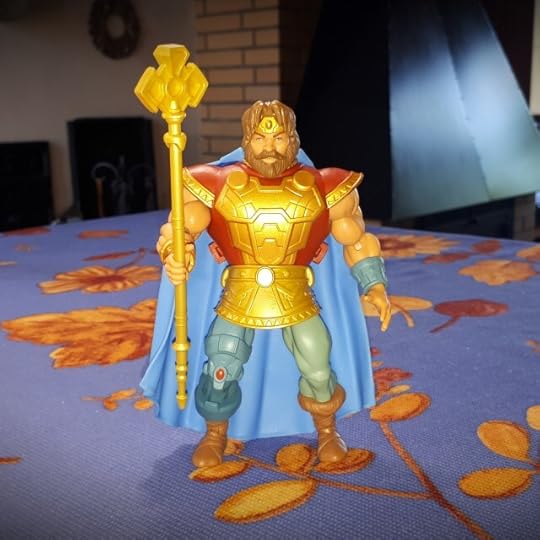
Masters of the Universe Origins Young King Randor
This version of King Randor is based on the 2002 cartoon, where Randor was protrayed as a somewhat younger and more active character than his Filmation counterpart. While the Filmation Randor mostly set around on his throne and occasionally gave a speech, the 2002 Randor charged into battle alongside his warriors on occasion and also seemed to do more actual governing. The 2002 cartoon also established that Randor was captain of the guard, i.e. Teela’s current, before he became king. All in all, I’d say that the 2002 cartoon features the best overall King Randor – and Randor is a difficult character, because his raison d’etre is to be the parent who does not understand or even see their child – though the Netflix CGI features the best version of Randor as a father. In case you’re wondering which version of King Randor is the worst, that would be the King Randor of Masters of the Universe Revelation, who narrowly missed winning the 2021 Darth Vader Parenthood Award.
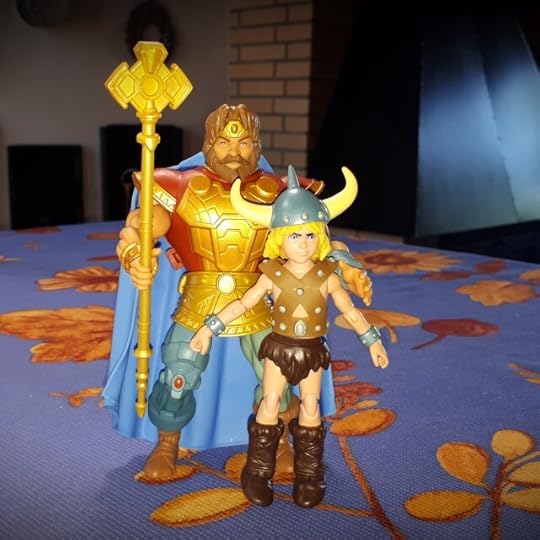
King Randor with little Prince Adam, portrayed here by Bobby from the Dungeons & Dragons cartoon
We mostly see Randor interacting (and frequently clashing) with a teenaged or young adult Adam, but there are very few scenes that show Randor as a young father across the various iterations of Masters of the Universe. So I decided to make one. And since today is Father’s Day in the US (in Germany, Father’s Day coincides with Ascension Day, which was on May 18 this year), this is the perfect time to post it.
New DadEternos Palace, the nursery:
“I don’t know if I can do this, Duncan. I’ve led armies, I’ve defeated the evil forces of Keldor and I try my best to be a good king for my people, but I don’t know if I can be a father.”
“You’ll do just fine, Sire. Trust me.”
“Easy for you to say, Duncan. You’re a natural at this father thing and I honestly don’t know how you do it, especially since you have no one to help you out.”
“It’s really not so difficult, Sire. Just trust your instincts.”
“And what if my instincts mislead me, Duncan? They’re so small and so fragile and…”
“Waaah!”
“Oh no! Now one of them is crying. What do I do?”
“Maybe you should just pick up the baby, Sire. That tends to calm them down.”
“But what if I drop it?”
“You won’t, Sire. Trust me.”
“Come on, little Adam. You are Adam, aren’t you? Cause I can’t tell them apart. Marlena colour coded the clothes, but I forget which one is supposed to be pink and which blue. There, my little one, that’s better.”
“Coo.”
“Waaaaah!”
“Oh no, now the other one is crying, too. What do I do, Duncan?”
“She’s probably just lonely. Maybe you should pick her up, Sire.”
“If you think so, Duncan. Come here, little one. Daddy has got you.”
“Coo.”
“Amazing. They stopped crying. And I think the pink one just smiled at me.”
“See, Sire? I told you you’d get the hang of this. Sniff. Though I think you’d better check their diapers. Unless it’s Teela. Sniff. No, not Teela. It’s one of the twins.”
“Diapers? You mean that smell is…”
“Exactly, Sire.”
“And… uhm… how do I change the diapers? And where are the diapers?”
“Sigh. I’ll show you, Sire.”
***
Fast forward some twenty years and Adam, Adora and Teela are all grown up and engaging in plenty of shenangigans and more adult activitiess of their own. So enjoy:
Orko InterruptusEternos palace, Teela’s bedroom:
“Smooch. Are you sure our parents won’t notice that we snuck away from the party?”
“Absolutely sure. My Dad and your parents are both at the reception for the High Council and your Dad is holding one of his endless speeches.”
“I’m certainly not sorry to miss that. But what about the guards?”
“I’m Captain of the guard and ordered them to patrol somewhere else. What about Cringer?”
“He’s a very discreet cat and knows when to make himself scarce.”
“So the coast is clear. And now kiss me again. Smooch.”
“Guys, guys, do you wanna see my new magic trick?”
“ORKO!”
“Uhm, am I interrupting something?”
“YES!”
***
The next morning:
“And then he said, ‘Teela, I love you. I’ve always loved you’.”
“And then?”
“Then I said, ‘Adam, you talk to much’.”
“And then?”
“Then I kissed him.”
“Oooh!”
“And then?”
“Then Orko showed up.”
***
I got some dollhouse furniture at IKEA to use as props for my Masters-of-the-Universe-piece Theatre photo stories. The size works perfectly with both the Origins and the larger Masterverse figures. The cute dinosaur plushie came with the set, by the way. And yes, Teela would totally have a plush dinosaur.
That’s it for today, folks. I hope you enjoyed this Masters-of-the-Universe-Piece Theatre Photo Story, because there will be more.
Disclaimer: I don’t own any of these characters, I just bought some toys, took photos of them and wrote little scenes to go with those photos. All characters are copyright and trademark their respective owners.
June 14, 2023
Same Old Debate, New Clothes: The Cozy Horror Controversy
Sigh. It’s that time of the year again and we’re having the same old debate again whether some interlopers are trying to ruin the purity of the genre and gentrify it by writing and reading the wrong sort of books.
This time around, the focus is not Hopepunk or what a certain podcast termed Squeecore, but cozy horror, cozy fantasy’s spookier sibling.
The current debate seems to have been sparked by an episode of the Books in the Freezer podcast about cozy horror (which I haven’t listened to yet), which received some pushback on Twitter, and in particular by a recent article on The Mary Sue by Julia Glassman on the cozy horror phenomenon and the backlash against it. Though the term “cozy horror” isn’t new. Here is an article by Jose Cruz from Nightmare Magazine, a horror mag, about cozy horror from 2021 and I’m pretty sure Cruz didn’t invent the term either. The phenomenon is much older anyway. What is now called cozy horror goes back to the ghost stories of the nineteenth century. A genre that – as Jess Nevins pointed out on Twitter – has triggered criticism and backlash for almost two hundred years now. And the reason was that ghost stories were mostly read and written by women. So yup, it’s plain old misogyny.
Okay, I’ll say it: cozy horror began w/19th century women’s ghost stories (dominant form of horror in the 19th century–women authors outnumbered men by more than 2:1), and the backlash against cozy horror now has its roots in the past misogynistic criticism against cozy horror.
— Jess Nevins (@jessnevins) June 10, 2023
Currently, most of the backlash seems to focus on Julia Glassman’s article from The Mary Sue rather than on the podcast episode that prompted the article. This criticism is not entirely unjustified, because the article is something of a mess.
Julia Glassman begins by discussing her issues with the horror genre and her problems finding horror she actually enjoys. I certainly sympathise, because I also had problems finding horror I enjoy. Though my problem wasn’t so much that horror was too gross or too scary for me, but that I found much of particularly filmic horror rather silly, sometimes to the point of self-parody. As a result, my attempts to write horror either turned into horror parodies or “Let’s find out was the supernatural entity wants” or both. In fact, I should maybe try to rebrand the Hallowind Cove series (which started out as an attempt to write horror and became a sort of horror parody set in a quirky small town) as cozy horror, since nothing else has worked to help those stories find their market. It was only when I realised that I actually prefer older styles of horror like the sort of thing that would have been found in Weird Tales during its heyday that I figured out how to write horror.
However, horror is a wide field and eventually Julia Glassman found that she enjoys folk horror. Then she explains how she discovered cozy horror, lists some examples and then sums up the debate that broke out on Twitter, when Sadie Hartmann, author of the non-fiction book 101 Horror Books to Read Before You’re Murdered (which would make a good subject for a non-fiction spotlight), linked to the Books in the Freezer episode about cozy horror and also offered some examples. Both Twitter threads are mostly people recommending books and films or asking for recommendations, but apparently there was some blowback, which has since been deleted.
Julia Glassman then continues to wonder why on Earth some people are so offended by the mere existence of cozy horror rather than focussing on genres and subgenres they actually enjoy? It’s a legitimate question. However, plenty of people decided to take issue with the answer Glassman offers.
Julia Glassman notes that for certain horror fans the only metric that counts is how much blood and gore there is and how viscerally terrifying it is. Basically, for some people horror is an endurance contest where he or she who can tolerate the most blood, gore and jump scares wins. Of course, horror is more than just blood, guts and jump scares and both Julia Glassman and Sadie Hartmann link to this 2021 article by Brian J. Showers, which makes exactly that point.
In the paragraph above, I wrote “he or she who can tolerate the most blood, gore and jump scares wins”. However, Julia Glassman points out that the person who reduces horror mainly to the blood, gore and jump scares is more likely to be a he. I’d add that this person is also more likely to be young, because horror is a genre that appeals to the young. Not that there aren’t plenty of older horror fans, but there is a reason that so much horror features bad things happening to teenagers.
So far, Julia Glassman has made mostly reasonable points. However, then she wrote this paragraph which is what caused most of the backlash:
It’s also undeniable that this problem is gendered. Endurance is associated with masculinity, and coziness is associated with femininity. Maybe that supposed femininity is what makes cozy horror feel so threatening to people who consider themselves hardcore horror fans. The cozy horror debate is almost identical to the YA debate: instead of recognizing that genres are fluid and multifaceted, people run screaming from anything associated with teen girls.
Of course, there are plenty of female horror fans – including plenty of women who love reading the hardcore bloods and guts stuff. Indeed, I suspect that the majority of horror readers are probably women, because the majority of readers of almost every fiction genre are women. Women are also the majority of readers of horror’s somewhat more respectable sister genre, the serial killer thriller. So no, female readers don’t shy away from blood and terror. And indeed, plenty of female horror fans showed up on Twitter to point out that they enjoy horror in all its blood-splattered glory. There are also many female horror writers. So in short, claiming that the readers and writers of the darker and bloodier forms of horror are male is nonsense.
However, there is a kernel of truth in that paragraph, because there definitely is an undercurrent of misogyny in the rejection of any genre or subgenre perceived to cater to female readers. You see this in the blanket dismissal of romance, of YA (even though there is a huge variety of YA books out there these days, a lot of people still think it’s all teen romance with a thin paranormal veneer), cozy mysteries, urban fantasy, cozy fantasy (even though some of the best known cozy fantasy writers are men) and now cozy horror. And considering that what is now called cozy horror grew out of the ghost story of the nineteenth and early twentieth century, the gothic romance of the 1960s and 1970s as well as paranormal romances, paranormal mysteries and paranormal chick lit, i.e. all genres associated with women, there definitely is a misogynistic element in the backlash against cozy horror, as Jess Nevins points out the tweet embedded above. The fact that several of those dismissing cozy horror are women doesn’t contradict this, because internalised misogyny is a thing.
The initial criticisms of The Mary Sue article and also the more reasoned ones came from within the horror community, but the debate quickly spilled out into the wider genre sphere. And that’s where we started getting seriously bad takes. Coincidentally, that’s also when several names familiar from previous debates popped up.
Raquel S. Benedict, whom regular readers of this blog may also remember from the “Squeecore” debate of early 2022, explained why she believes cozy horror is a bad thing in this Twitter thread. In the course of that thread, Benedict also links to an episode of the Rite Gud podcast, which she hosts, where she and her guest Andrew F. Sullivan discuss the supposed gentrification of horror. The Rite Gud episode (transcript here) dates from March, i.e. it predates the current debate, so this is clearly a subject close to Benedict’s heart. Simon McNeil, another name people may remember from last year’s “Squeecore” debate, also weighed in on his blog.
As for why Benedict, McNeil and Sullivan object to the existence of cozy horror, there are several arguments, most of them familiar from previous debates. McNeil’s main point is that he believes that horror should make people uncomfortable and that cozy horror is therefore an oxymoron. He also dismisses several of the examples given in The Mary Sue article, particularly the 2014 animated series Over the Garden Wall, as “children’s media”. Now Over the Garden Wall may well be aimed at children – I haven’t seen it. Besides, as I’ve pointed out above, horror is a genre that appeals to the young. However, there is a certain sneering undertone in the way McNeil dismisses “children’s media” that you often find with a certain type critic, who tend to conflate “I don’t like this” or “I’m not the target audience for this” with “This is YA”, whereby YA is inevitably viewed as a bad thing.
Indeed, I got into an argument on Twitter with a member of the anti-cozy horror brigade (not anybody mentioned above, just some rando, likely young), who responded to a tweet of mine pointing out that while “cozy horror” may be a new label, the phenomenon itself is far from new and listing several examples with “That’s all just YA shit”. Of course, nineteenth and early twentieth century ghost stories, gothic romance and the lighter edge of urban fantasy are not YA and neither are the extremely popular paranormal cozy mysteries, but the tweet is very telling in that for some people, anything they don’t like is automatically assumed to be YA. This is not limited to the anti-cozy-horror brigade, but a far more general phenomenon. SFF with romantic elements is often hit by “That’s just YA” accusations, as if only young people want to read stories about people falling in love.
Both Benedict and McNeil also talk about the gentrification of horror, a metaphor likely inspired a handful of haunted house stories and movies they don’t like. Basically, the worry seems to be that since horror is experiencing a resurgence in popularity following the massive crash of the genre in the 1990s, more writers and bigger publishers will move into horror fiction and that horror will become sanitised and bland. Cozy horror is apparently viewed as a vanguard of this process – the first mainstream coffee shop or wine bar to open in the neighbourhood to run with the gentrification metaphor. Though personally I find the metaphor hugely problematic, because gentrification does untold harm in the real world by displacing and destroying whole neighbourhoods. People writing and publishing books some folks don’t like is in no way comparable to the real world harm done by gentrification.
Never mind that there is absolutely no real evidence that horror is becoming bland and cozy and sanitised. The examples offered are a mixed bag as well and include clueless articles about final girls on mainstream SFF websites, the recent versions of The Haunting of Hill House and Candyman, both of which were inferior to the source material (the new Candyman in particular completely missed the point of the original) and also got very mixed reviews, The Book of Accidents by Chuck Wendig, which I haven’t read, and two short stories by John Wiswell. However, clueless and shallow articles on genre websites are not exactly a rare phenomenon nor a new trend. Neither are bad remakes of better movies. And while John Wiswell uses horror tropes in his fiction, I wouldn’t call him a horror writer. Instead, he borrows the furniture of the horror genre, the haunted houses and the vampires and mystery portals to nowhere, to tell completely different stories.
The main issue seems to be a worry that writers some people don’t like – Benedict calls them “some of the most toxic, puritanical hacks in SFF” – are moving into horror and that they will turn the horror into “bland sludge”. As for who these toxic puritanical hacks are, they’re the writers who are currently appearing on the Hugo and Nebula ballots. I suspect I might be one of them. So in short, it’s another round of “writers we don’t like are writing books we don’t approve of and are ruining the genre in the process”.
The kernel of truth in this claim is that we have seen more fiction with horror elements appear on the Hugo and Nebula ballots in recent times, both published in explicit horror magazines like Nightmare Magazine or The Dark as well as in more general SFF magazines like Uncanny or Tor.com. However, it’s also notable that many of the authors in question – Sarah Pinsker, T. Kingfisher, John Wiswell, Catherynne M. Valente, Chuck Wendig – have been deploying horror elements in their fiction for a long time now. As for why we are seeing more fiction with horror elements on the Hugo and Nebula ballot these days, a) horror of all types is currently experiencing something of a renaissance following the collapse of the genre in the 1990s, and b) if Hugo and Nebula nominators read more horror and horror-tinged fiction, more of it will wind up on the ballots.
Also, the current generation of Hugo and Nebula voters are more open towards horror, whereas previous generations of voters had strong prejudices against both fantasy and horror. That’s why classic horror movies like the 1958 Hammer version of Dracula or 1976’s Carrie were no awarded, in spite of being very good movies. But they were horror and Hugo voters at the time did not want any horror in their science fiction. That said, the first non-SF story ever to win a Hugo Award, “That Hell-Bound Train” by Robert Bloch in 1959, was a horror story. Nonetheless, there is no great conspiracy here, just a shift in reader tastes and the boundaries between science fiction, fantasy and horror, which were always artificial anyway, gradually becoming more porous again.
As for claiming that some nebulous clique of toxic and puritanical hacks (never mind that the writers in question are all lovely people, at least those I’ve met) is moving into horror for commercial reasons, i.e. to make more money, that’s completely ridiculous. If you want to write solely for money, horror is about the worst genre you could choose, because it’s still a small niche dominated by small presses. Science fiction and fantasy are both bigger markets and for fiction, YA, crime/mystery/thriller and particularly romance are far more lucrative than any flavour of speculative fiction. And the big writing money is in non-fiction and tech writing anyway. So even if horror is more popular these days, it’s not a genre where you will make big money. And indeed, Benedict even says so herself in that Rite Gud episode.
Furthermore, there is absolutely no evidence that “cozy horror” is in the process of overtaking the entire horror genre, because of the currently big and up-and-coming names in horror fiction – Stephen Graham Jones, Silvia Moreno-Garcia, Catriona Ward, Gabino Iglesias, Josh Malerman, Chuck Wendig, Christina Henry, V. Castro, Grady Hendrix, Cynthia Pelayo, Alma Katsu, Paul Tremblay, etc… – very few are even remotely what I’d call cozy. And writers borrowing horror tropes to write different kinds of stories has little impact on the horror genre per se.
In general, the fear that horror – and science fiction and fantasy for that matter – are being ruined by big publishers shying away from more extreme material and insisting on happy endings – is just weird. For starters, there is no evidence for any of that happening. Manhunt by Gretchen Felker-Martin, a horror novel that’s popular with the Rite Gud crowd, was published by Tor’s Nightfire imprint, i.e. the biggest publisher of science fiction, fantasy and horror in the English-speaking world.
In response to a tweet by Ellen Datlow (who really should know better) claiming that SF readers no longer want downbeat endings, Camestros Felapton pointed out that the Hugo winners for best short story (as well as the finalists) of the past six years just don’t support this claim. Also, I don’t think anybody should be judged for wanting fiction with happy endings or fiction that is comforting. A lot of people have a lot of shit doing on in their lives and if a reading a romance novel or a cozy witch mystery makes them forget their problems for a little while, then more power to them.
And even if the Big Five Publishers really did suddenly decree that all horror fiction must be cozy and have a happy ending – and there is no sign that this is happening – horror has a robust ecosystem of small presses, which kept the genre alive and afloat during the wilderness years after the 1990s collapse, so other types of horror would still find a home and an audience.
So in short, the whole cozy horror debate is very much a tempest in a teacup. What makes the whole debate even more wearying is how depressingly familiar all of the arguments and many of the protagonists are. We’ve seen the same arguments trotted out during last year’s “Squeecore” debate or the Hopepunk debate of 2019 or – coming from the opposite side of the political spectrum – during the puppy wars of 2015/2016 – and approx. fifteen years ago, when YA SFF, urban fantasy and paranormal romance exploded in popularity around the same time and brought new readers and writers into the genre, who were not exactly welcomed with open arms. We’ve seen the very same arguments made by clueless German pop culture critics – who ironically hated horror with a passion – in the 1970s. And if you go back even further, you’ll find similar debates and uproars fought out in the letter pages of magazines and vintage fanzines.
In 2016, I wrote a post about the Three Fractions of Speculative Fiction, three groups of readers and fans with different preferences who have clashed repeatedly over the course of the past hundred years. In the past, most clashes have been between the traditionalist fraction and the anti-nostalgic fraction with the character-driven fraction sitting on the sidelines, but since the turn of the millennium, most conflicts seem to be either the traditionalist (e.g. the puppies and their various offshoots) or the anti-nostalgic fraction going up against the character-driven fraction. And while the traditionalist and the anti-nostalgic fraction will never agree on which books they like, they are usually eerily united in which books and stories they don’t like, namely the ones that are currently winning awards and acclaim. It’s notable that Chuck Wendig is hated by both the Far Right (for daring to put gay people in a Star Wars novel) and the Far Left (for being not radical enough).
In general, the argument boils down to a few points: “There is a new trend in SFF and I don’t like it. There are authors winning awards and I don’t understand why. This new trend is destroying the genre and these new people are all just in it for the money and the accolades, but they’re not real fans, they use the furniture of the genre without understanding it and they are violating the purity of the genre. This new stuff is not even SFFH, but it’s romance, YA or some other inferior form of literature. This means the impending death of the genre.”
In short, it’s all depressingly familiar and I probably should have just ignored this latest flare-up of this ages old argument, but the whole cozy horror debate annoyed me enough to put in my two cents.
Comments are open for now. Don’t make me shut them down.
June 6, 2023
Masters-of-the-Universe-Piece Theatre: “The Prisoner of Castle Grayskull Revisited”
It’s time for another Masters-of-the-Universe-Piece Theatre photo story. The name “Masters-of-the-Universe-Piece Theatre” was coined by Kevin Beckett at the Whetstone Discord server.
Back in March, I posted a Masters-of-the-Universe-Piece Theatre toy photo story called “The Prisoner of Castle Grayskull”, set during the time in part 2 of Masters of the Universe: Revelation, when Duncan is imprisoned up in the dungeons beneath Castle Grayskull, after Skeletor took over the Castle, murdered the original Sorceress and turned Evil-Lyn into the new Sorceress, something Lyn isn’t particularly happy about. So Lyn eventually takes matters into her own hands, steals the Sword of Power from Skeletor and becomes the champion of Grayskull herself.
Mattel recently made a figure of the powered-up Lyn, called Dark-Lyn. She’s gorgeous, so I got her for my collection.
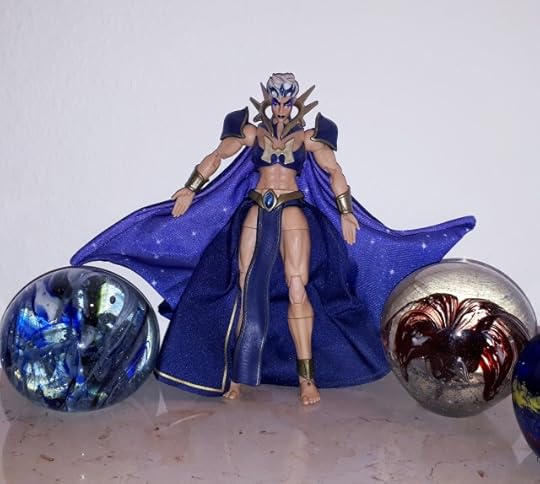
Dark-Lyn in her full powered up glory.
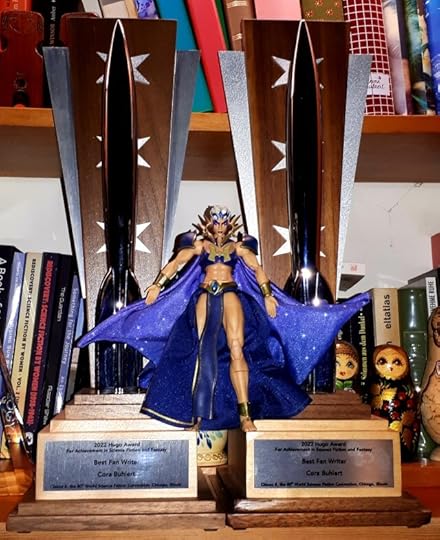
Dark-Lyn, Goddess of the Hugo Award
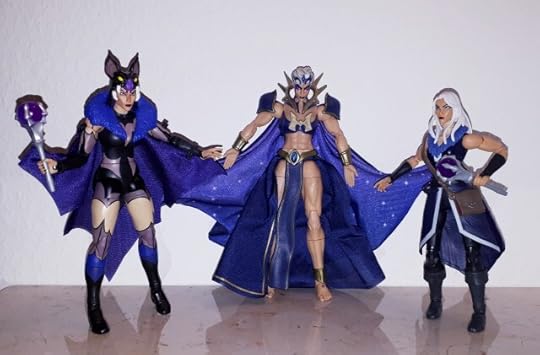
The three versions of Evil-Lyn. I think I might have a Lyn problem.
Masters of the Universe: Revelation never really goes into what happens to Duncan, after Lyn gets the Power. We only see him again, after he has escaped from the dungeon with the help of the tentacled creature known as the Orlax of Primeria and joins the battle outside Castle Grayskull.
But would Lyn really ignore her favourite prisoner? I don’t think so, so let’s see what happens when the powered up Lyn goes to see Duncan in the dungeon.
In the dungeons deep underneath Castle Grayskull:

You’ll have to imagine the Orlax of Primeria, since I still haven’t managed to procure a good substitute.
“All right, Orlax, just give me some more of that disgusting but conductive slime, so I can get the hell out of here.”
EEEYUUUBBB!
“Orlax? What’s the matter? Footsteps. Seems someone’s coming to see me. But who? Lyn? Skeletor? Or dare I hope for rescue?”
“Sigh. It’s Lyn. And that frog critter.”
“Well, hello Duncan. Still hanging out, I see…”
“Hi, Lyn. Can’t say it’s a great pleasure to see you.”
“The prisoner is still secure, Mistress. I’m a good dungeon master, I am. I am very scrupulous about my duties. You will not be sorry that you appointed me.”
RIBBIT!
“I did not appoint you as dungeon master and neither did Skeletor. You appointed yourself, you slithering little salamander.”
“Frog. I’m a frog, Mistress. And I do good work, yes I do.”
RIBBIT!
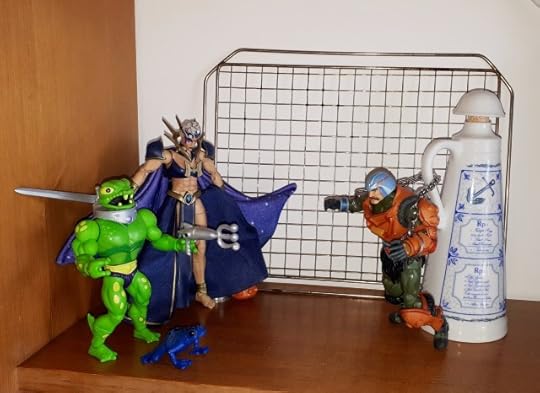 “Well, whatever. Leave us alone now, Frog-Boy. Duncan and I have things to discuss.”
“Well, whatever. Leave us alone now, Frog-Boy. Duncan and I have things to discuss.”
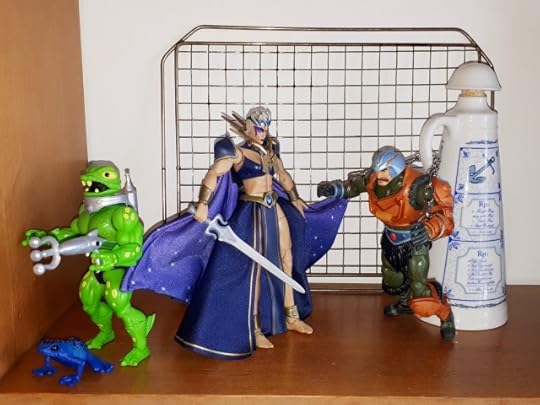 “It’s Frog-Monger, not Frog-Boy. But yes, I know when I’m not wanted. You want to sing the mating song with the prisoner again. Then go ahead. Sing mating songs and make little tadpoles. In the meantime, my friend and I will go hunting for tasty flies outside the Castle.”
“It’s Frog-Monger, not Frog-Boy. But yes, I know when I’m not wanted. You want to sing the mating song with the prisoner again. Then go ahead. Sing mating songs and make little tadpoles. In the meantime, my friend and I will go hunting for tasty flies outside the Castle.”
RIBBIT!
“What did you do to the Orlax, Lyn? Did you hurt it again? Cause it screamed.”
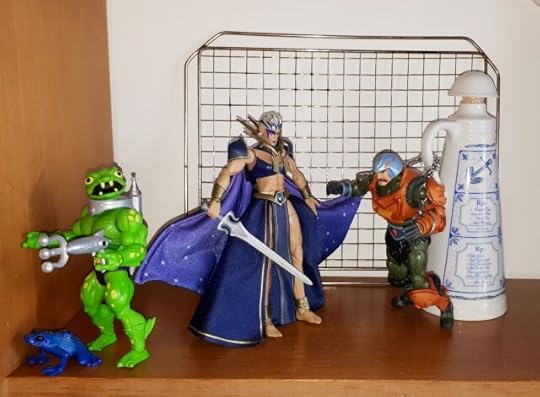 “Why are you so concerned about the Orlax, Duncan? Shouldn’t you rather worry about yourself?”
“Why are you so concerned about the Orlax, Duncan? Shouldn’t you rather worry about yourself?”
“Because the Orlax is a living being and it’s hurting. Not that you’d understand.”
“Oh by the way, the Orlax is scared of her. Always has been. He says she’s the Destroyer of Worlds. But then, the Orlax has always been a little dramatic.”
RIBBIT!
“Whatever you have to say, Lyn, make it quick, cause I’m really not in the mood.”
“Why so grumpy, Duncan? Don’t you have anything to say about my new look?”
“Well, it seems Skeletor managed to make you wear even less clothing than the last time around, which is certainly a feat.”
“Not Skeletor. Skeletor is history. I took the Sword of Power from him and kicked him out of the Castle.”
“Good. Then could you maybe give the sword back to Adam, cause he needs it. And maybe you could let me out of here, too, while you’re at it.”
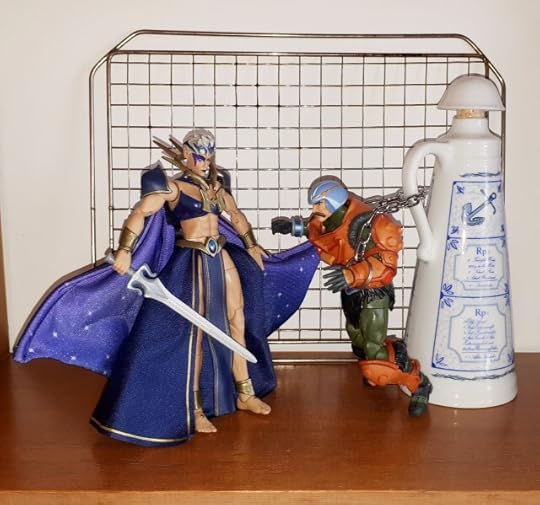 “Give up the sword? Not a chance. I am my own champion now. And it seems that revealing attire comes part and package with the Power of Grayskull. After all, how else to show off those impressive muscles?”
“Give up the sword? Not a chance. I am my own champion now. And it seems that revealing attire comes part and package with the Power of Grayskull. After all, how else to show off those impressive muscles?”
“The sword isn’t yours, Lyn. It was never meant for you – or Skeletor. It was always intended for Adam.”
“Well, if Little Prince Weakling wants it back, he can always come and get it. But I’m afraid that he is much too busy sticking his own very unimpressive sword into your daughter Teela…”
“I have no idea what you’re talking about.”
“Don’t pretend to be stupider than you are, Duncan. In this very moment, as we’re talking, Little Prince Weakling is making out with Teela – yes, with your precious daughter – in the Talon Fighter at Point Dread. Though he apparently has some problems figuring out which part goes where.”
“Why exactly are you telling me this, Lyn? Do you think I mind?”
“Well, given the tendency of the Eternian Kings to sow their wild oats and then not follow through on their promises, you certainly should. Just ask Keldor – if you can find him, that is.”
“Listen, Lyn, even if what you say is true…”
“Oh, it is. Or would I lie to you?”
“You’d lie to me without a second thought. Lying is your second nature. Always was, always will be.”
“Ouch. Low blow, Duncan. I should punish you for that. You’re lucky that I like you.”
“So even if Adam and Teela are sharing an intimate moment with each other, why would I mind? They love each other. Always have, always will. And Adam is one of the best and bravest men I know. Though I do hope they’re being careful…”
“Ha, so you are a worried father, after all. And anyway, why did you give the sword to Little Prince Weakling, when you could have taken the sword and the power for yourself, could have been the champion of Grayskull – and of your darling Sorceress – yourself?”
“Because that’s not how it works. Adam is the chosen one. He has been since the day he was born. My job… and my privilege was to watch over him, be there for him and make sure he was ready to take on the burden of the champion, when the day comes.”
“Oh please! I’m sick to death of chosen ones. Your little Prince Weakling, Randor, even Keldor for all his whining about how Daddy didn’t love him, they were all born to privilege. Whereas you and I had to fight for every little thing we have. So who’s the chosen one here? The little Prince born with a silver spoon in his mouth or people like you and me who clawed our way out of the gutter?”
“That’s not how it works, Lyn.”
“Of course it is. I chose myself. I raised the sword, said the magic words and now I have all the power in the universe at my fingertips. I could rip Randor’s soul out of his body, if I wanted, or Skeletor’s for that matter. I could hurl a lightning bolt from the sky and put the fear of Zoar into Little Prince Weakling and your precious daughter…”
“Leave them alone, Lyn.”
“Or what? You’ll stop me? You’re my prisoner, Duncan. And even if you were free, you couldn’t stop me, cause I have the Power now. I am the ruler of Eternia.”
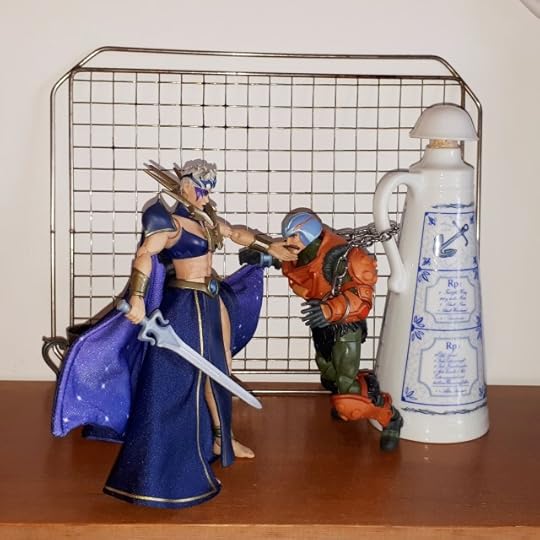 “But a queen needs a king. So what do you say, Duncan? Will you be my king and rule Eternia by my side?”
“But a queen needs a king. So what do you say, Duncan? Will you be my king and rule Eternia by my side?”
“Eternia already has a king. And I swore an oath…”
“Spare me your misplaced loyalty. You’ve spent more than twenty years basically running the kingdom and commanding Eternia’s forces, while Randor set around on his throne in his gilded armour, looking regal. You’ve even raised Randor’s son for him, because Randor couldn’t be bothered. And then, the moment something goes wrong, Randor kicks you out of the palace and throws you away like a broken sword. So no, Randor, deserves none of your loyalty. He never did.”
“Randor is my king, Lyn. And my friend.”
“King before friend, always. And anyway, after everything you’ve done for Randor, for Marlena, for Adam, for Teela, for the Masters of the Universe, for all of them, where are they now? Cause I don’t see any of your friends coming to rescue you.”
“There are more important things than rescuing…”
“Oh, I’m sure there are. Like Little Prince Weakling and your precious daughter making out. Or Randor peering very intently at a bunch of maps, pretending that he’s actually fit to lead anybody. You know what, Duncan, you’re an idiot. Time and again placing your loyalty and your faith in people who won’t do the same for you. You’ve wasted years supporting Randor who’s always treated you like a lackey. And you’ve wasted years on a woman who would never commit to you, who’d never even acknowledge you and your daughter, but would rather devote her life to this crumbling castle….”
“If I wasted years of my life, then I at least wasted them on people who are worthy and causes that matter. Whereas you wasted years of your life on Skeletor.”
“Yes, but I got wise and kicked him out. He’s running for the Mystic Mountains now, crawling back to his brother. But that reunion won’t go the way Skeletors hopes and I for one just wish I could be there to see Randor kick his arse and throw him in the deepest darkest dungeon… But wait, I can. I have the Power now and I can see anything, go anywhere in the whole universe.”
“If you can go literally anywhere in the universe, then why are you down here in the dungeon with me?”
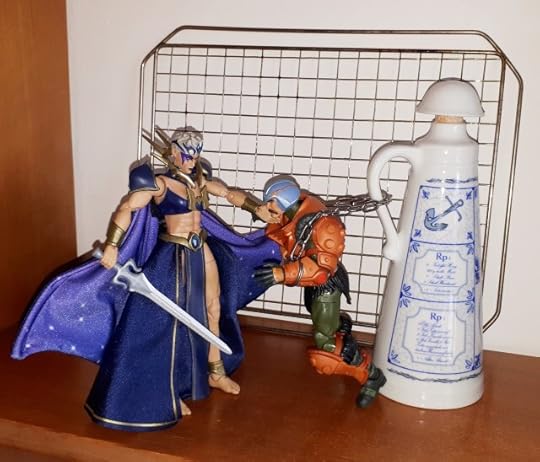 “Isn’t it obvious, Duncan? Because I like you. And because having all this power at my fingertips, seeing the entire universe, seeing how lonely and desolate and devoid of meaning it all is makes me want to find solace in the arms of another human being. Skeletor was right, you know, whenever he went on about the loneliness of good and evil. Your little Prince knows it, too. That’s why he’s hanging out with imbeciles like Orko or Cringer and seeking comfort in the arms of your precious daughter, provided he can finally figure what to do. Because it’s lonely being a god. And I don’t want to be lonely…”
“Isn’t it obvious, Duncan? Because I like you. And because having all this power at my fingertips, seeing the entire universe, seeing how lonely and desolate and devoid of meaning it all is makes me want to find solace in the arms of another human being. Skeletor was right, you know, whenever he went on about the loneliness of good and evil. Your little Prince knows it, too. That’s why he’s hanging out with imbeciles like Orko or Cringer and seeking comfort in the arms of your precious daughter, provided he can finally figure what to do. Because it’s lonely being a god. And I don’t want to be lonely…”
“Lyn…”
“Hush, Duncan. You know loneliness, too, don’t you? All those years pining after a woman who didn’t want you, who would not commit to you and your daughter…”
“She had her duty…”
“Oh please! Teela-Na could’ve found a way to make it work, if she’d wanted to. But she didn’t. And deep down in your heart you know. You know that this crumbling pile of stones always meant more to her than you and even her own child. Just as this crumbling Castle and the power buried within it always meant more to Skeletor than I ever could. So yes, Duncan, we’re both lonely. So why shouldn’t we find comfort in each other’s arms?”
“Will… will you unchain me? Cause otherwise this might be difficult.”
“You don’t like a woman to take control, do you? But no, the chains stay on. Trust me, it’s more fun that way.”
“Will you at least power down? You’re not used to the power and don’t know your own strength yet.”
“Oh please! Do you think I’m stupid. That’s how I got Skeletor. I seduced him, persuaded him to power down and stole the sword from him. Do you honestly think I’d fall for the same trick?”
“It was worth a try.”
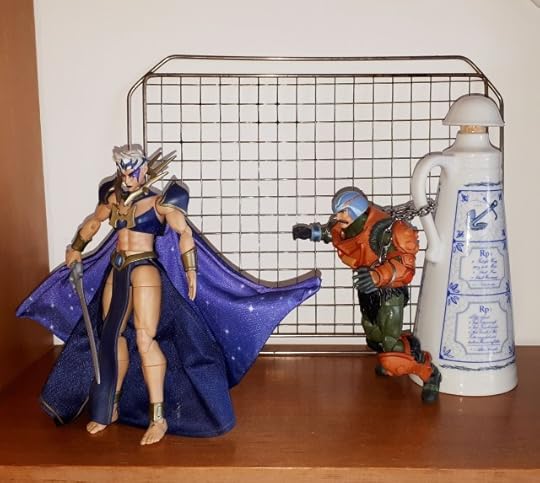 “You know what, Duncan? I’m sick of you, sick of Skeletor, sick of it all. You can stay here in the dungeon, pine for your dear departed Sorceress and rot for all I care. Me, I’ve got a whole universe, no, a whole multiverse to explore. And since this whole multiverse is lonely and desolate and uncaring, maybe it’s time someone put it out of its misery.”
“You know what, Duncan? I’m sick of you, sick of Skeletor, sick of it all. You can stay here in the dungeon, pine for your dear departed Sorceress and rot for all I care. Me, I’ve got a whole universe, no, a whole multiverse to explore. And since this whole multiverse is lonely and desolate and uncaring, maybe it’s time someone put it out of its misery.”
“Lyn, wait….”
 “Great, Duncan. You just blew another chance at finally getting out of here. And why? Because you couldn’t submit to Lyn? Couldn’t lay back and think of Eternia just once. Oh well, back to Plan A. Orlax, are you still there?”
“Great, Duncan. You just blew another chance at finally getting out of here. And why? Because you couldn’t submit to Lyn? Couldn’t lay back and think of Eternia just once. Oh well, back to Plan A. Orlax, are you still there?”
Eeeeeyoooo!
“I’ll take that as a ‘yes’. Can you give me some more of that disgusting but highly conductive slime.”
SCREECH.
“Sigh. What now? Lyn, is that you?”
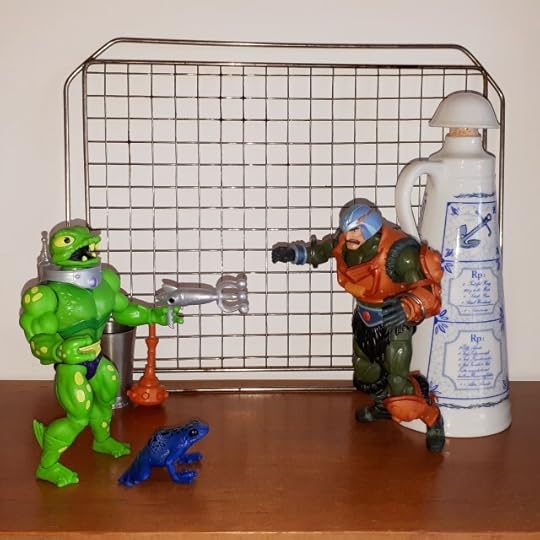 “Oh. It’s you. What do you want? Gloat some more? Listen, if you want revenge for being imprisoned down here, you’ve got the wrong man. You’ve been here since before I ever set foot in this Castle.”
“Oh. It’s you. What do you want? Gloat some more? Listen, if you want revenge for being imprisoned down here, you’ve got the wrong man. You’ve been here since before I ever set foot in this Castle.”
“I don’t want revenge. I just have some advice, from one prisoner to another. That one, the tall female, she be crazy.”
“Lyn? Yes, I know.”
“But you don’t know all of it. The Orlax, he’s scared of her. He says she’s the Destroyer of Worlds, the one he came to warn all of you humans about, except that you wouldn’t listen, that you never listen.”
“Listen how? No one can even figure out what the Orlax means to say.”
“Well, I’m telling you what the Orlax means to say. He says that one, the tall female, is the Destroyer of Worlds who brought death and destruction to the Orlax’s homeworld and laid waste to entire universes. Now I don’t know if the Orlax is right, but I know that the tall female is crazy. I also know that she likes you. So sing mating songs with her. Make little tadpoles. Anything to stop her from destroying the universe.”
RIBBIT!
“Why do you even care, Frog Monger?”
“Why I care? Because I live in this universe, too. It’s not always been kind to me, but I still live here. And besides, this universe also has nice things like big fat flies, cool ponds and shady swamps. I don’t want all that destroyed.”
RIBBIT!
“So you want me to do what exactly? Offer up my body, so that Lyn won’t destroy the universe?”
“Now you understand, human.”
RIBBIT!
***
In Masters of the Universe: Revelation, Lyn does suffer an existential crisis at the realisation that she lives in an uncaring universe where God is dead and everybody is alone. In many ways, she’s a Lovecraft protagonist faced with the horrors of the cosmos. But while Lovecraft protagonists curl up and go mad, Lyn decides to put the entire universe and everybody in it out of her misery and is only barely stopped by all the heroes and even Skeletor working together.
It is also notable that unlike almost everybody else who wields the Power of Grayskull, Adam does not go mad, does not rip out anybody’s soul nor does he try to destroy the universe because it’s cold and uncaring. However, unlike almost everybody else who wields the Power of Grayskull, Adam also has a strong support system of friends and loved ones.
As for Lyn and Duncan, both of whom are alive and single at the end of Masters of the Universe: Revelation, will they eventually get together? I guess we’ll find out in Masters of the Universe: Revolution next year.
That’s it for today, folks. I hope you enjoyed this Masters-of-the-Universe-Piece Theatre Photo Story, because there will be more.
Disclaimer: I don’t own any of these characters, I just bought some toys, took photos of them and wrote little scenes to go with those photos. All characters are copyright and trademark their respective owners.
Cora Buhlert's Blog
- Cora Buhlert's profile
- 14 followers


